- Home
- Ann M. Martin
Kristy at Bat Page 3
Kristy at Bat Read online
Page 3
Claudia passed me a bag of Doritos. “Have some of these,” she said. “They’ll make you feel better.”
Trust Claudia to believe that a handful of chips can change your outlook on life.
I took a few and ate them. After all, maybe she was right. I had nothing to lose by trying. But when the crunching was over, my mood hadn’t changed one bit.
Jessi told a long story about a time she’d been turned down after auditioning for a big role in some ballet. But then it turned out that she danced the part after all, when the person who’d won the role came down with the flu.
I wasn’t expecting any happy endings to my story.
Stacey said she didn’t understand the team system at school anyway. She reminded us of the way her ex-boyfriend Robert had quit the basketball team because he hated the way athletes are idolized at SMS.
But Robert was a first-string player. That was all I could think of.
Mary Anne didn’t say much at all. She just looked at me with these big, sad eyes.
Augh! I knew my friends meant well, but everything they said and did just made me feel worse. It wasn’t their fault. I was so bummed that there was no way anyone could cheer me up.
Over the weekend, I did my best to work up some enthusiasm for Dream Camp. I felt I owed Watson that much. I knew he thought that going to camp would help cheer me up about not making the first-string team.
On Saturday night, after I’d spent some time thinking about what to pack, I decided to oil my baseball glove, a job I usually love to do in the spring. The smell of the oil always gives me a little thrill, and as I work I replay moments from the previous softball season in my mind. This year, the only scenes I could picture were from tryouts. I finished up the job as soon as I could and put the glove aside, along with my softball cleats.
On Sunday night, my mom made us a special going-away dinner of salmon and asparagus. Watson loved it. And he ate two helpings of the rhubarb pie she’d made for dessert. I didn’t have much of an appetite myself. Plus, it was hard to force myself to join in the conversation about how much fun we were going to have at camp. After dinner, I went upstairs and finished packing. Whether I was psyched about it or not, I was headed for Dream Camp first thing in the morning.
Here’s a funny thing. When I woke up, I felt a little better. Maybe it was because I’d had a few days to get used to the idea of being put on the second-string team. Or maybe it was because I was, despite myself, starting to feel a little more excited about Dream Camp. After all, this was the big day. We were headed to Delaware.
That afternoon, Watson threw our suitcases into the trunk of his car. We hugged everybody good-bye (that can take awhile, in my family) and then we were off.
Watson was in a really, really good mood. He was like a kid on Christmas morning. He spent the first half hour of the trip singing “Take Me Out to the Ball Game.” (Actually, he bellowed. Watson is no Pavarotti.) Finally, he must have grown tired of that one tune (I know I did), and he switched to that “Put Me In, Coach” song.
Unfortunately, or fortunately, as the case may be, he didn’t know all the words to that one. He gave it up after a few tries. Then he turned to me and grinned. “We’re on our way,” he said for the fortieth time.
“I know,” I said.
“Soon I’ll be shaking the hand of one of this country’s greatest athletes,” Watson went on. “William F. Bain.”
“What does the F stand for, anyway?” I asked. Not that I cared.
“Franklin,” Watson said. “That was his father’s name.”
If I’d asked about Bill Bain’s shoe size, Watson probably could have told me.
Instead, Watson started in on the Bill Bain stories. “Did I ever tell you about the time Bill Bain made three home runs in one game?’ he asked.
Of course he had. But I didn’t mind hearing it again. Actually, it was a pretty good story, and Watson told it well. “Was that when he had the broken finger?” I asked. Bill Bain was famous for “playing hurt,” which means he was a real tough guy who didn’t let small injuries keep him out of the game.
Watson nodded. “That’s right,” he said. He was off and running. “He’d broken the finger while helping a little boy fix his bicycle. Bain was like that, always taking time out to do favors. Anyway, there he was, with the finger in a splint. It had to affect the way he held his bat, but you’d never have known it that day. I remember watching the game on TV, over at my uncle Moe’s house. He was a big Bill Bain fan too.”
I knew Uncle Moe had gone to that big ball field in the sky, so I made a sympathetic noise.
“When Bain smacked the first one out of the park, we were ecstatic,” said Watson. “But when he hit the second one and the third …” He paused, remembering. “… It was just amazing,” he continued in a quieter voice. “I’ll never forget the way he ran the bases after that third homer. He didn’t throw his fist in the air the way they do now, or smile at the fans. He just ran the way he always did — head down, looking serious. Then, after he’d crossed home, he ducked down into the dugout.”
“That was it?” I asked. I knew it wasn’t, but I wanted Watson to tell the rest.
“No,” said Watson. “The crowd at the ballpark wouldn’t stop cheering. The umpires had to stop the game because the noise was so distracting. Finally, Bill Bain came out of the dugout and tipped his hat. The crowd went absolutely bananas.” Watson had this faraway smile on his face. “Back at home, Uncle Moe and I were going bananas too. It was some afternoon.”
“I bet it was,” I said. Watson’s enthusiasm was infectious. I was starting to remember how exciting baseball could be. “Wasn’t it right after that game that Bill Bain went on the Jimmy Carson show?”
Watson burst out laughing. “That’s Johnny Carson. I guess you’ve heard these stories before,” he said. “Yes, it was. I’ll never forget that either. It was the first time my parents let me stay up that late. The Johnny Carson show didn’t even start until after the late news. But I managed to keep my eyes open long enough to watch.”
“Couldn’t you have just taped it?” I asked.
He shook his head. “We didn’t have VCRs in those days,” he said. “It was the Dark Ages, remember?”
I laughed. We like to tease Watson about being old. Sometimes Sam asks him what it was like to hunt dinosaurs. The truth is, he isn’t all that much older than Mom.
Watson went on to tell how Bill Bain had played catch with Johnny Carson on national TV. “Johnny couldn’t throw well at all,” said Watson. “Or maybe he was just fooling around to make the audience laugh. Anyway, it was hilarious.” He cracked up, just thinking about it. “Maybe it’s on tape somewhere,” he told me. “I’d love to find that. You’d get a real kick out of seeing it.”
I nodded. And kept nodding as Watson went on with his Bill Bain stories. He didn’t need much encouragement to keep talking. And I didn’t mind listening, since it made the time go by. After awhile, though, I started tuning out just a bit. I’ve heard all the stories before. And I was beginning to feel a little, well, bored. Also, I had started thinking again about being chosen for second string. Finally, I stopped making those “Oh, really?” and “What happened next?” comments.
Suddenly, Watson stopped talking. “Kristy?’ he asked. “Is everything okay?” He looked at me with real concern.
“Everything is fine,” I said firmly.
Watson nodded. He’s lived with me long enough to understand that what I meant by that was, “Even though everything is not fine, I don’t want to talk about it.”
The rest of the drive was a lot quieter. Watson talked a bit more about Bill Bain, and we made awkward small talk over our truck-stop dinner, but basically we each kept to our own thoughts.
Finally, we arrived at our hotel. It looked like a nice place, and our accommodations were excellent. We were in a suite, which meant that we each had our own room and bathroom, but we shared a living room. We unpacked quickly (I saw that Watson had brought a whole
pile of Bill Bain memorabilia, such as baseball cards and sports magazines, hoping to have them autographed) and headed off to bed.
The next day would be the first day of Dream Camp. I may not have been quite as thrilled about it as Watson was, but I couldn’t help feeling excited. I was even looking forward to meeting Bill Bain.
On Monday, while I was living through the Bill Bain-athon that was my drive to Delaware with Watson, Claudia was sitting for David Michael, Karen, and Andrew. (Emily Michelle had a play date with a little girl named Dakota whose mom works with my mom.)
You have to understand that Claudia knows next to nothing about the world of sports. But as you know, I definitely do. And I groaned as soon as I began to read her notebook entry when I returned from Delaware. I could see the problem coming from a mile away. But Claudia was taken by surprise. She doesn’t have a clue about baseball cards.
Except as art objects. That’s how she was looking at them that day, when David Michael began showing her his collection. She noticed the colors of the uniforms, the way the cards were designed, the little drawings on the backs.
“Forget about all of that,” David Michael said impatiently, pulling another card out of shoe box where he kept them. “Look at this one! Michael Cannon. He is the coolest player. He always hits home runs.”
“I like the teal trim on his uniform,” said Claudia thoughtfully, “although I think he’d look better in something more on the purple side.”
David Michael rolled his eyes.
“What about this guy?” asked Karen, reaching into the box for a card.
“Hold it,” said David Michael, grabbing her hand. “Nobody touches my cards until I give them permission.”
Karen shrugged. “Okay,” she said. “Can I have permission?”
“Sure,” said David Michael.
“Can I?” asked Andrew.
“Are your hands clean?” asked David Michael. Andrew held his hands up, and David Michael inspected them. “Okay,” he said.
Karen and Andrew rummaged happily through the cards. “I like this guy’s name,” said Karen. She showed Claudia a card.
“Roscoe Vaughn,” read Claudia. “Nice.”
“Look at this one,” said Andrew, pulling out another card. He tried to sound out the name on it.
Karen leaned over to see it. “Bucky Shephard,” she read. “He plays first base for the Dodgers. He must be really good.”
David Michael snorted. “All these guys are really good,” he said. “They’re major league players. They’re not like the Krushers.”
“What’s wrong with the Krushers?” Karen asked, standing up and putting her hands on her hips.
“Nothing, nothing,” muttered David Michael. “Hey, Claudia, can we go to the playground?”
Claudia knew he meant the Stoneybrook Elementary School playground, which is a pretty long walk from Kristy’s house.
“Sure,” said Claudia. “It’s a beautiful day. I’d love a walk. It’ll take awhile, though. What do you guys think?” she asked Karen and Andrew.
“Yay!” they cried. Karen ran to put on her sneakers, while Claudia rummaged around in the kitchen, assembling a snack to bring along. (Like any good sitter, she knows it’s important to be prepared. Kids can be very cranky when they’re hungry.)
Fifteen minutes later, they were ready to go. Karen brought her jump rope; Andrew had a Nerf football; Claudia had packed her backpack with peanut-butter-and-cracker sandwiches, juice boxes, and some apples; and David Michael was carrying his shoe box.
“Are you sure you want to bring that?” Claudia asked him as they set out.
He nodded. “Definitely. See, a bunch of the kids are bringing their card collections to the playground today. That’s why I wanted to go. We’re going to show each other what we have and maybe trade some cards too.”
“That sounds cool,” said Claudia. (This is where I would have seen the big, flashing DANGER sign.)
“I want to trade!” announced Andrew. He sat down on the sidewalk and stuck out his lower lip.
“But you don’t have any cards,” Karen reminded him.
Andrew’s lip began to quiver.
Claudia saw a tantrum coming.
Fortunately, David Michael did too. And, good kid that he is, he knew how to nip it in the bud. “You know what, Andrew?” he said. “You can have a few of my cards.”
Andrew was stunned. “I can?” he asked. The lip stopped quivering. “Really?” He stood up. “Which ones? Can I have that Bucky guy?”
“Let’s see,” said David Michael. He opened the shoe box and rummaged around. “If I have a double of that card, you can.” He poked around some more. “Yup! Here it is. And you can have these too.” He handed Andrew four cards.
Andrew was overwhelmed.
“Say ‘thank you,’ ” Claudia prompted him.
“Thank you,” he whispered. He was holding the cards carefully, as if they were made of china.
“Do you want me to carry them for you?” Claudia asked.
Andrew nodded. “But first I have to look at them one more time,” he said. He leafed through them slowly, drinking in all the details of each one. Then he handed them to Claudia.
They walked for a while in silence.
Then Andrew spoke up. “Do I have to trade them?” he asked suddenly. He looked worried. “I just want to keep them. I want to have a collection.”
“That’s okay,” David Michael assured him. “They’re your cards. You can do whatever you want with them.”
Andrew brightened. By then, they were nearly at the playground.
Karen handed her jump rope to Claudia and asked her to carry it. Then she ran ahead. “Last one there is a rotten egg!” she cried over her shoulder as she dashed for the jungle gym.
Claudia spotted a group of kids near the slide. So did David Michael. “There they are,” he said. He trotted across the playground to join them, his shoe box under his arm.
Claudia and Andrew stopped for a few minutes to check out the swings, then joined the group. Claudia spotted several familiar faces. Jake Kuhn was there, along with his sister Laurel. (He’s eight; she’s six.) Claudia spotted their mom and baby sister Patsy, sitting with a group of parents by the teeter-totters. Buddy Barrett (he’s eight) was on hand, and so was Jackie Rodowsky, who’s seven and very accident-prone.
A few other boys and girls whom Claudia didn’t know were there too. David Michael seemed to be familiar with most of them, though. She figured he knew them from school.
The group was in a loose circle. As Claudia arrived, Jake Kuhn was starting to show off his collection. He held up a notebook filled with plastic pages, each with a pocket made to hold a card. “See, it’s organized by team and by position,” Jake explained. “I have full sets of almost every team in the American League.”
The kids seemed impressed.
Claudia certainly was. Jake’s collection was well organized and beautifully displayed. It was a big step up from David Michael’s shoe box.
Then another boy, whom Claudia didn’t know, stepped forward. “Nice,” he said, nodding at Jake. “Anything valuable?”
“Well …” began Jake. “My mom doesn’t let me spend too much on any one card.” He paused. “But I do have one of Rafael Hernandez in his rookie year. My cousin gave it to me.”
“Is it mint?” the boy asked eagerly.
Jake shrugged. “I guess it’s in pretty good condition.” He flipped the pages until he found it and showed it to the boy.
“Looks good,” the boy said. “If you ever want to trade, let me know.”
Claudia pulled David Michael aside. “What’s ‘mint’?” she asked. “And who is that boy?”
“Mint means it’s in perfect condition,” explained David Michael. “That’s important if you want to make good trades. And that’s Barry. I don’t know his last name, but he goes to SES.”
Claudia and David Michael watched, with growing dismay, as Barry began to take over the group. He showed off h
is collection, which was housed in “lockers,” each card individually wrapped and stored in a compartment according to team. He boasted about how many of his cards were “mint,” and talked a lot about how much each card was worth. He seemed to be more interested in the value of the cards than anything else, Claudia noticed.
Not all the kids were like Barry, though. Some of them even seemed impressed with a few of the cards in David Michael’s collection. (Barry basically ignored it, as soon as he saw the shoe box.) And a few of them sounded as if they enjoyed talking about the players and their stats instead of about what the cards were worth.
But Claudia could tell that seeing the other kids’ collection had upset David Michael. Suddenly, he wasn’t so thrilled with his overstuffed shoe box. As they left the playground later that afternoon, he couldn’t stop talking about how he was going to build the best baseball card collection ever.
“The scorebook or the baseball? Or maybe I should bring the bat?” Watson was standing in our shared living room at the hotel, going through the pile of Bill Bain memorabilia he’d brought to camp. We were just about to head to the Welcome Breakfast, where we’d meet our fellow campers and hear about the coming week at Dream Camp. Watson was obviously nervous about meeting Bill Bain. He was having a hard time deciding which piece of his collection he wanted to have autographed first.
“Don’t bring any of it,” I suggested. “He probably won’t have time to autograph things this morning anyway.”
Watson looked relieved. “You know, that’s a very good point,” he said. “Anyway, I don’t want the man to think I’m a pushy fan.”
“Right,” I agreed. I had to smile to myself. I was seeing a new side of Watson these days. He was acting almost like a little boy. I was glad he was so happy and excited about being at Dream Camp.
I was feeling excited myself. How could I help it? I picked up my glove and punched a fist into it a few times. Today I was going to have to “show my stuff” out there on the field — in front of real, live major league players.
Yikes.
“Nervous?” Watson asked me.

 Karen's Tea Party
Karen's Tea Party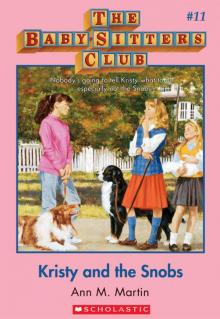 Kristy and the Snobs
Kristy and the Snobs Best Kept Secret
Best Kept Secret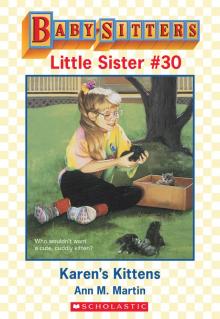 Karen's Kittens
Karen's Kittens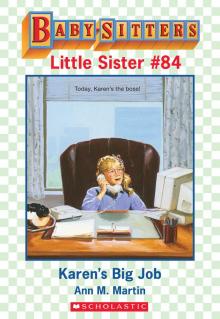 Karen's Big Job
Karen's Big Job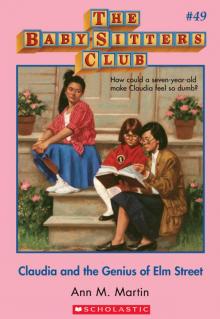 Claudia and the Genius of Elm Street
Claudia and the Genius of Elm Street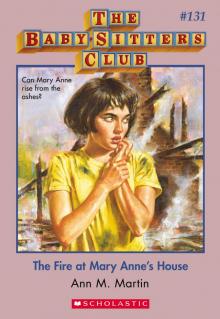 The Fire at Mary Anne's House
The Fire at Mary Anne's House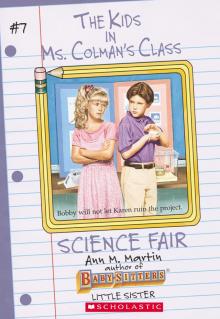 Science Fair
Science Fair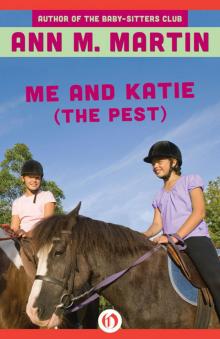 Me and Katie (The Pest)
Me and Katie (The Pest)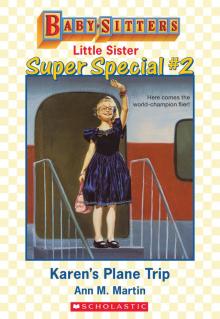 Karen's Plane Trip
Karen's Plane Trip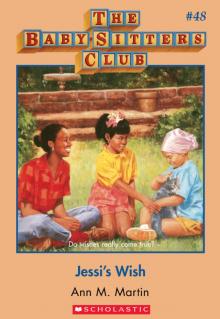 Jessi's Wish
Jessi's Wish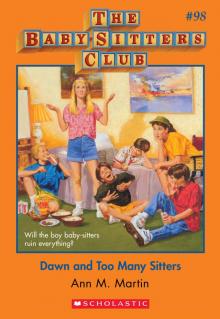 Dawn and Too Many Sitters
Dawn and Too Many Sitters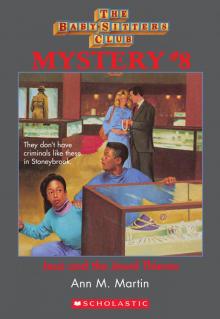 Jessi and the Jewel Thieves
Jessi and the Jewel Thieves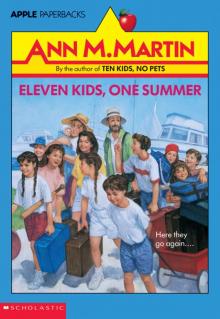 Eleven Kids, One Summer
Eleven Kids, One Summer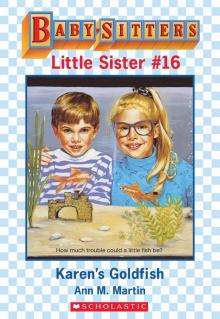 Karen's Goldfish
Karen's Goldfish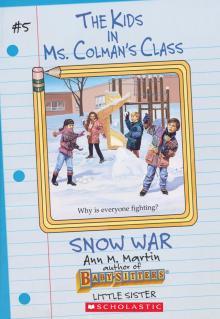 Snow War
Snow War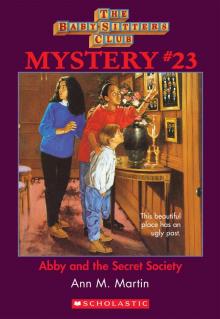 Abby and the Secret Society
Abby and the Secret Society Keeping Secrets
Keeping Secrets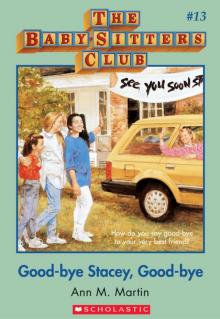 Good-Bye Stacey, Good-Bye
Good-Bye Stacey, Good-Bye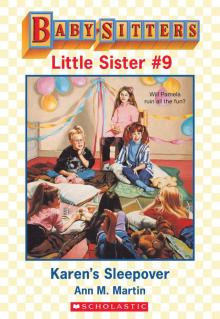 Karen's Sleepover
Karen's Sleepover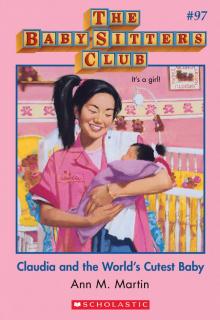 Claudia and the World's Cutest Baby
Claudia and the World's Cutest Baby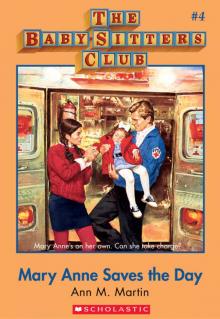 Mary Anne Saves the Day
Mary Anne Saves the Day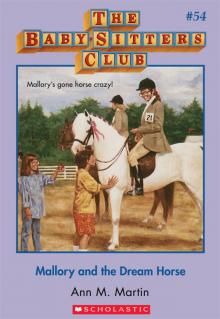 Mallory and the Dream Horse
Mallory and the Dream Horse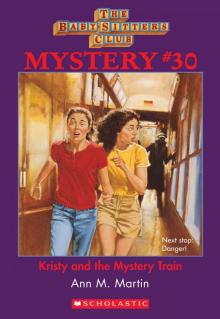 Kristy and the Mystery Train
Kristy and the Mystery Train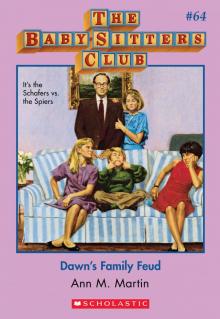 Dawn's Family Feud
Dawn's Family Feud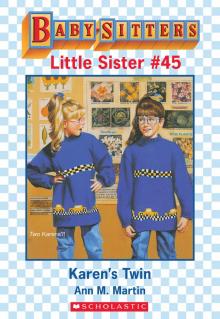 Karen's Twin
Karen's Twin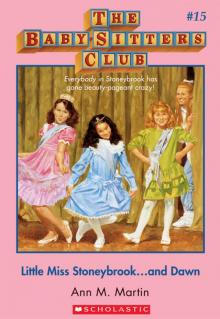 Little Miss Stoneybrook... And Dawn
Little Miss Stoneybrook... And Dawn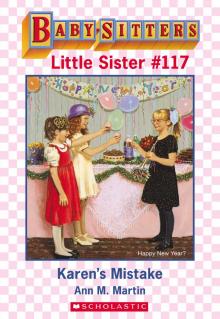 Karen's Mistake
Karen's Mistake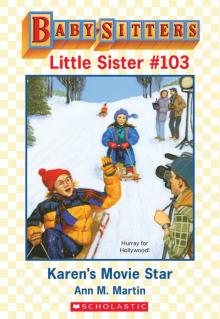 Karen's Movie Star
Karen's Movie Star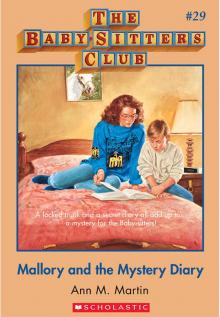 Mallory and the Mystery Diary
Mallory and the Mystery Diary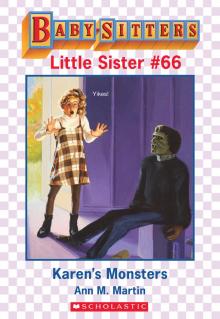 Karen's Monsters
Karen's Monsters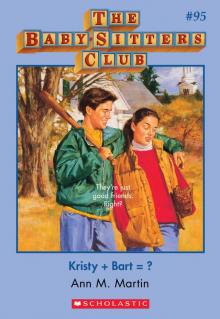 Kristy + Bart = ?
Kristy + Bart = ?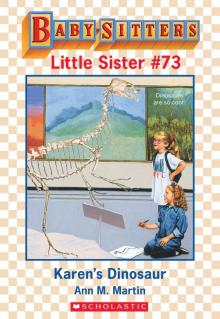 Karen's Dinosaur
Karen's Dinosaur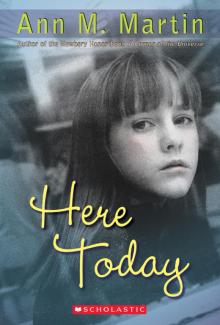 Here Today
Here Today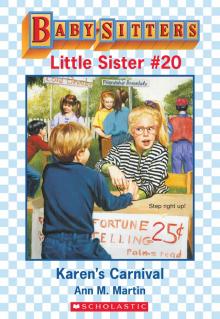 Karen's Carnival
Karen's Carnival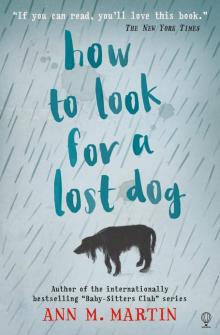 How to Look for a Lost Dog
How to Look for a Lost Dog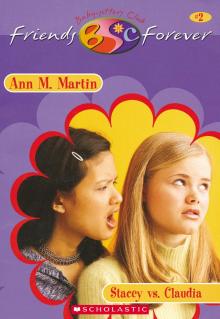 Stacey vs. Claudia
Stacey vs. Claudia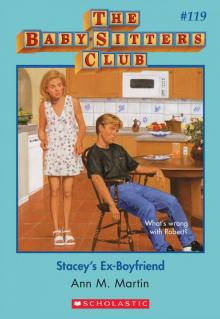 Stacey's Ex-Boyfriend
Stacey's Ex-Boyfriend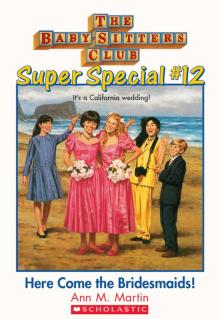 Here Come the Bridesmaids!
Here Come the Bridesmaids! Graduation Day
Graduation Day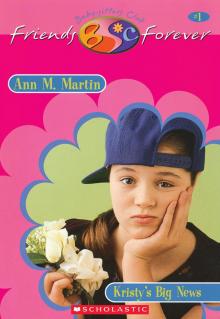 Kristy's Big News
Kristy's Big News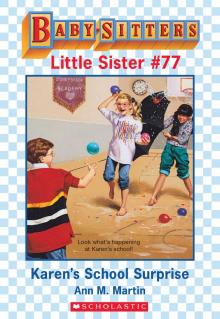 Karen's School Surprise
Karen's School Surprise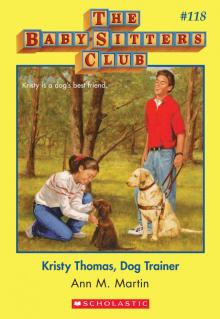 Kristy Thomas, Dog Trainer
Kristy Thomas, Dog Trainer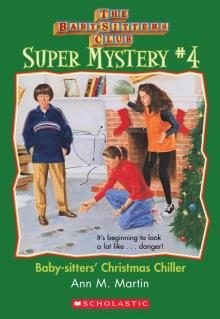 Baby-Sitters' Christmas Chiller
Baby-Sitters' Christmas Chiller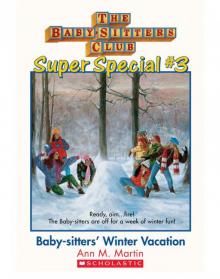 Baby-Sitters' Winter Vacation
Baby-Sitters' Winter Vacation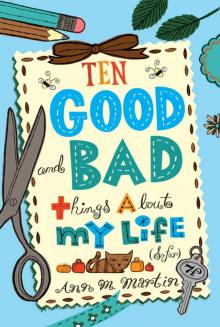 Ten Good and Bad Things About My Life
Ten Good and Bad Things About My Life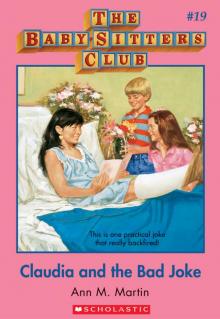 Claudia and the Bad Joke
Claudia and the Bad Joke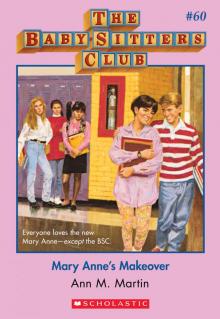 Mary Anne's Makeover
Mary Anne's Makeover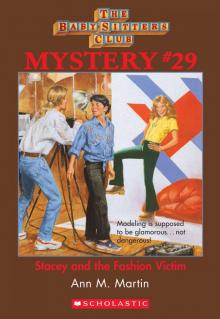 Stacey and the Fashion Victim
Stacey and the Fashion Victim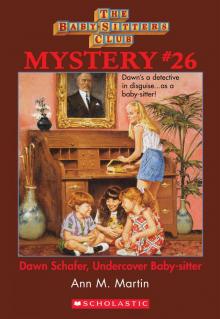 Dawn Schafer, Undercover Baby-Sitter
Dawn Schafer, Undercover Baby-Sitter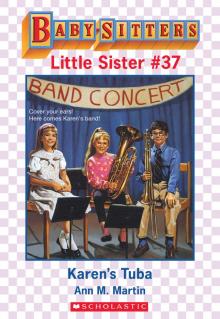 Karen's Tuba
Karen's Tuba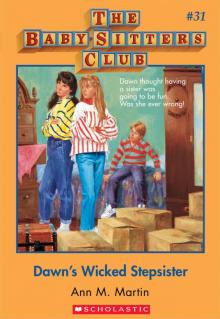 Dawn's Wicked Stepsister
Dawn's Wicked Stepsister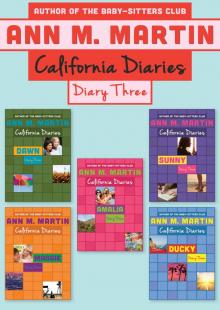 Diary Three: Dawn, Sunny, Maggie, Amalia, and Ducky
Diary Three: Dawn, Sunny, Maggie, Amalia, and Ducky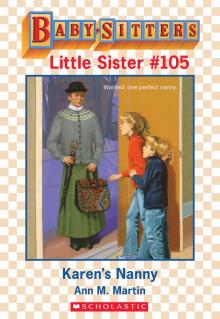 Karen's Nanny
Karen's Nanny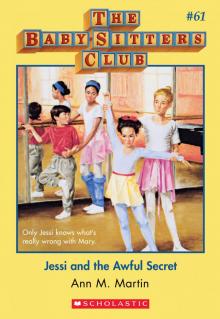 Jessi and the Awful Secret
Jessi and the Awful Secret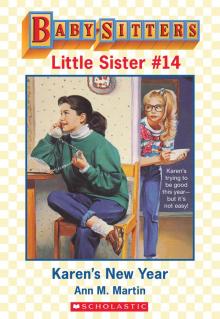 Karen's New Year
Karen's New Year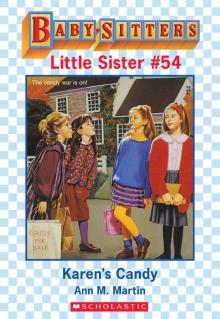 Karen's Candy
Karen's Candy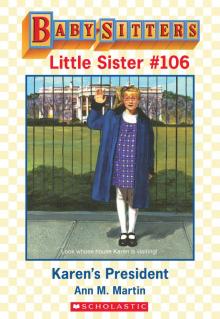 Karen's President
Karen's President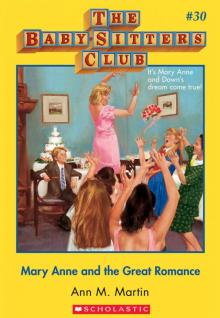 Mary Anne and the Great Romance
Mary Anne and the Great Romance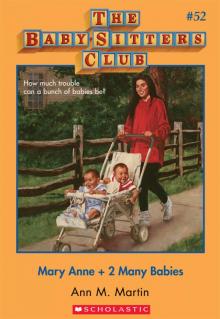 Mary Anne + 2 Many Babies
Mary Anne + 2 Many Babies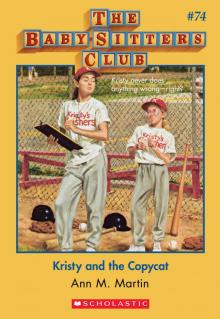 Kristy and the Copycat
Kristy and the Copycat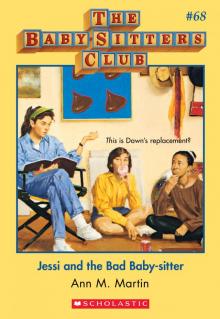 Jessi and the Bad Baby-Sitter
Jessi and the Bad Baby-Sitter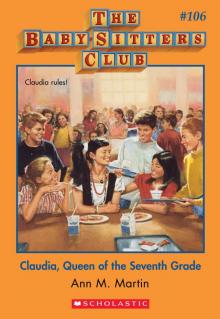 Claudia, Queen of the Seventh Grade
Claudia, Queen of the Seventh Grade Claudia and the Lighthouse Ghost
Claudia and the Lighthouse Ghost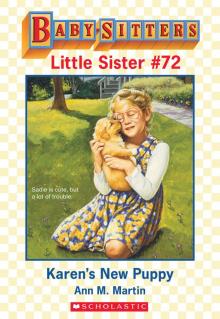 Karen's New Puppy
Karen's New Puppy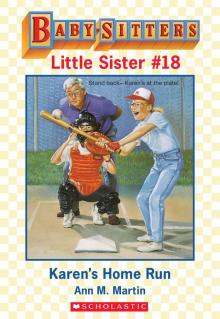 Karen's Home Run
Karen's Home Run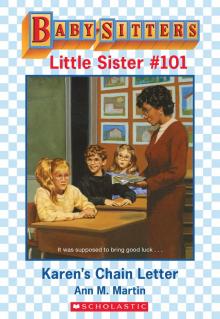 Karen's Chain Letter
Karen's Chain Letter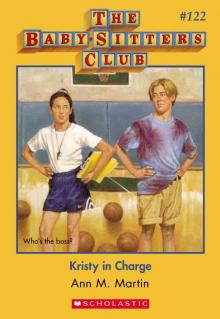 Kristy in Charge
Kristy in Charge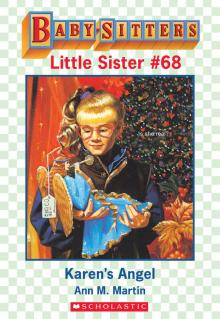 Karen's Angel
Karen's Angel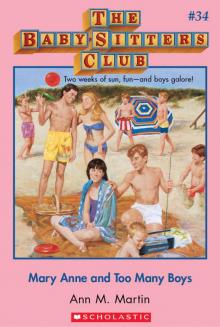 Mary Anne and Too Many Boys
Mary Anne and Too Many Boys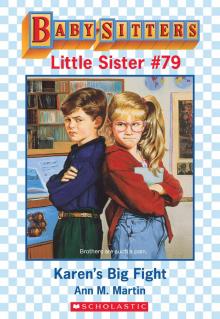 Karen's Big Fight
Karen's Big Fight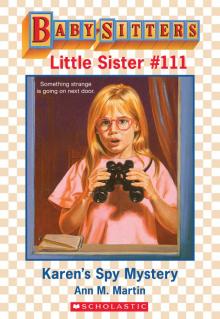 Karen's Spy Mystery
Karen's Spy Mystery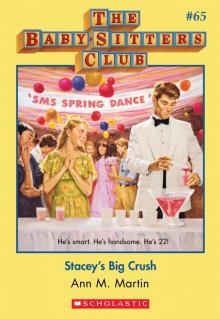 Stacey's Big Crush
Stacey's Big Crush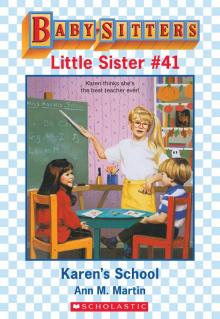 Karen's School
Karen's School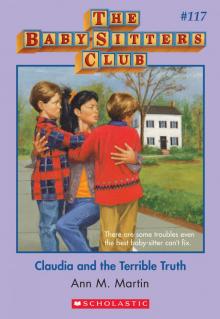 Claudia and the Terrible Truth
Claudia and the Terrible Truth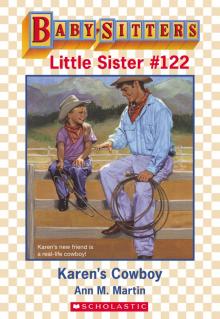 Karen's Cowboy
Karen's Cowboy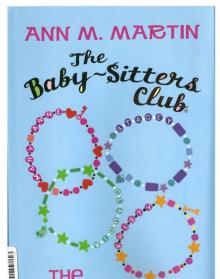 The Summer Before
The Summer Before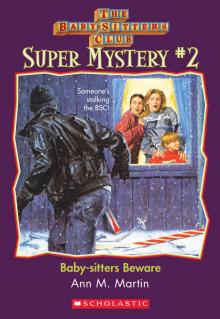 Beware, Dawn!
Beware, Dawn!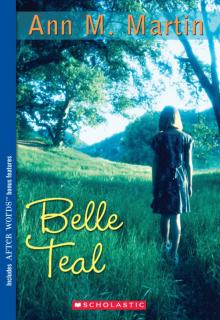 Belle Teale
Belle Teale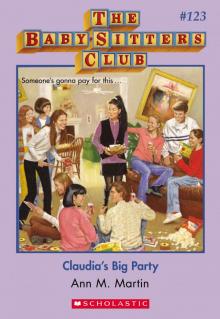 Claudia's Big Party
Claudia's Big Party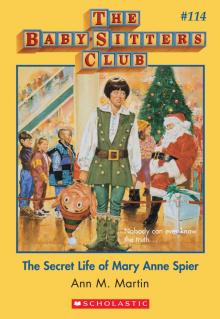 The Secret Life of Mary Anne Spier
The Secret Life of Mary Anne Spier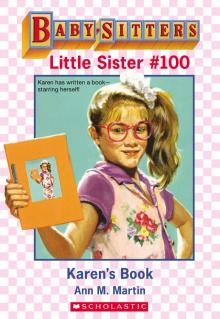 Karen's Book
Karen's Book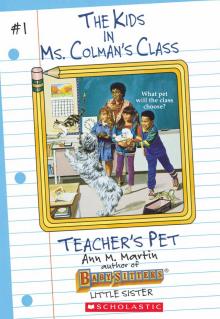 Teacher's Pet
Teacher's Pet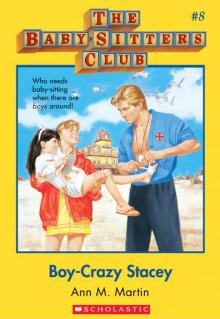 Boy-Crazy Stacey
Boy-Crazy Stacey Claudia and the Disaster Date
Claudia and the Disaster Date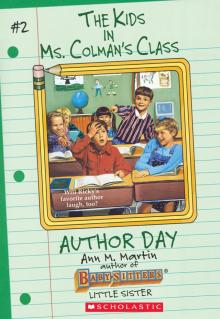 Author Day
Author Day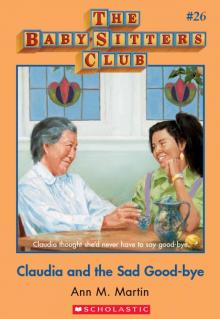 Claudia and the Sad Good-Bye
Claudia and the Sad Good-Bye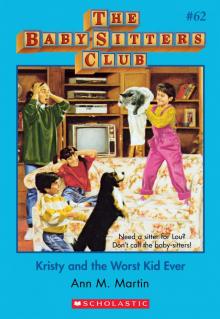 Kristy and the Worst Kid Ever
Kristy and the Worst Kid Ever Yours Turly, Shirley
Yours Turly, Shirley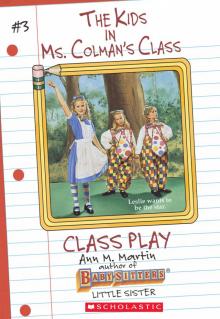 Class Play
Class Play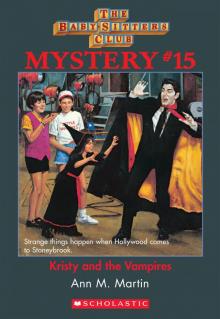 Kristy and the Vampires
Kristy and the Vampires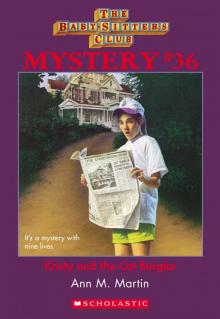 Kristy and the Cat Burglar
Kristy and the Cat Burglar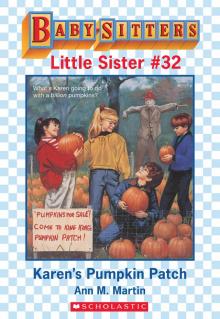 Karen's Pumpkin Patch
Karen's Pumpkin Patch Stacey and the Mystery at the Empty House
Stacey and the Mystery at the Empty House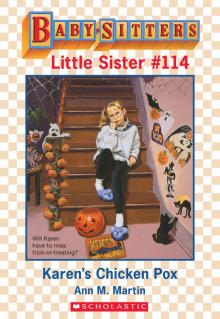 Karen's Chicken Pox
Karen's Chicken Pox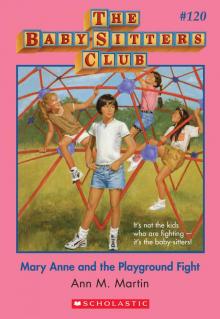 Mary Anne and the Playground Fight
Mary Anne and the Playground Fight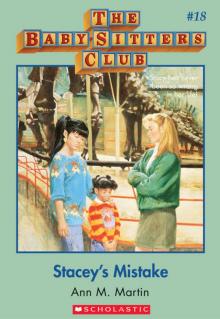 Stacey's Mistake
Stacey's Mistake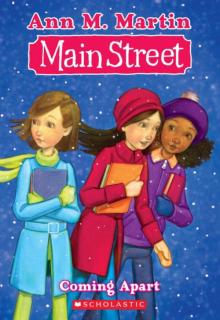 Coming Apart
Coming Apart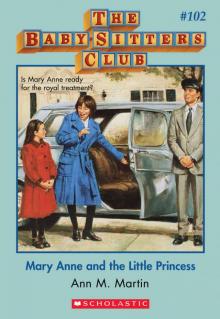 Mary Anne and the Little Princess
Mary Anne and the Little Princess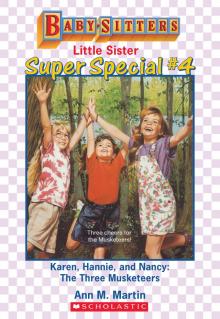 Karen, Hannie and Nancy: The Three Musketeers
Karen, Hannie and Nancy: The Three Musketeers 'Tis the Season
'Tis the Season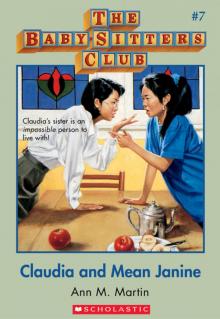 Claudia and Mean Janine
Claudia and Mean Janine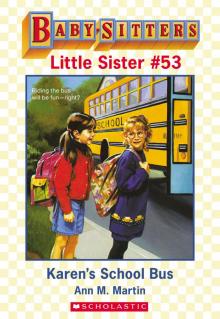 Karen's School Bus
Karen's School Bus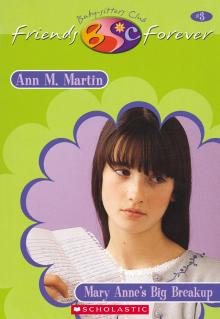 Mary Anne's Big Breakup
Mary Anne's Big Breakup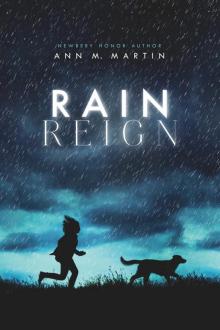 Rain Reign
Rain Reign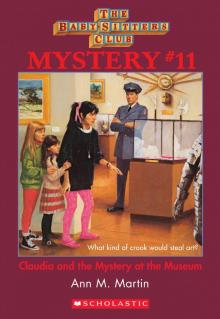 Claudia and the Mystery at the Museum
Claudia and the Mystery at the Museum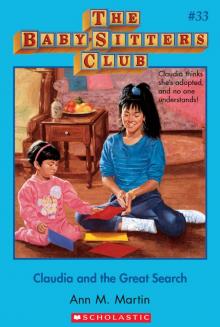 Claudia and the Great Search
Claudia and the Great Search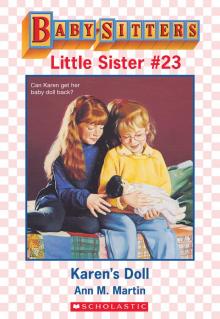 Karen's Doll
Karen's Doll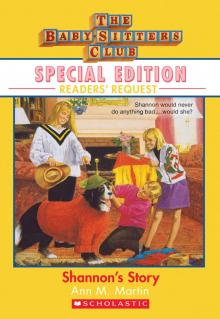 Shannon's Story
Shannon's Story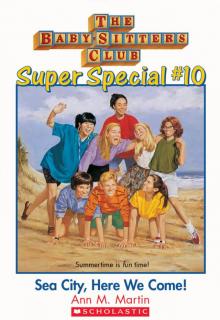 Sea City, Here We Come!
Sea City, Here We Come!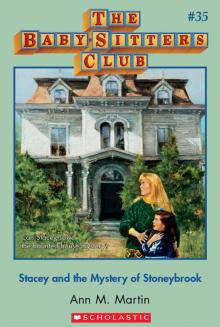 Stacey and the Mystery of Stoneybrook
Stacey and the Mystery of Stoneybrook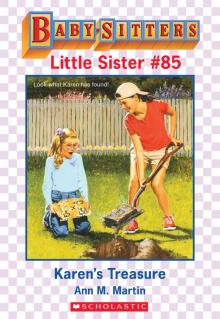 Karen's Treasure
Karen's Treasure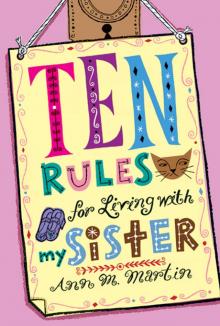 Ten Rules for Living With My Sister
Ten Rules for Living With My Sister With You and Without You
With You and Without You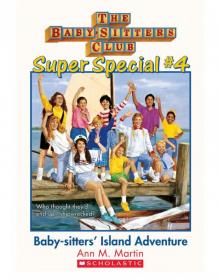 Baby-Sitters' Island Adventure
Baby-Sitters' Island Adventure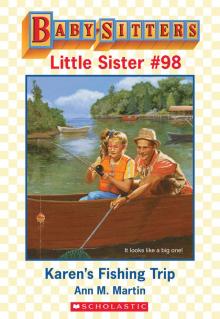 Karen's Fishing Trip
Karen's Fishing Trip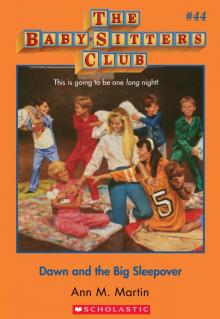 Dawn and the Big Sleepover
Dawn and the Big Sleepover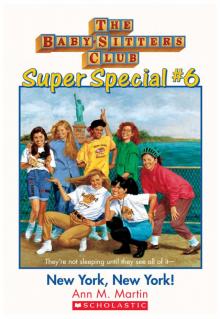 New York, New York!
New York, New York! Ten Kids, No Pets
Ten Kids, No Pets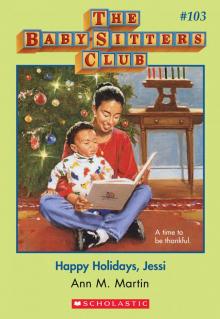 Happy Holidays, Jessi
Happy Holidays, Jessi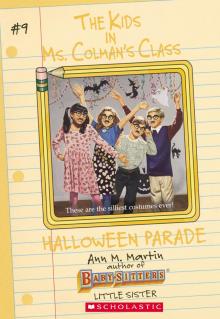 Halloween Parade
Halloween Parade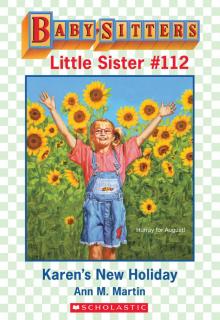 Karen's New Holiday
Karen's New Holiday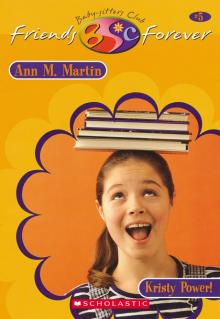 Kristy Power!
Kristy Power!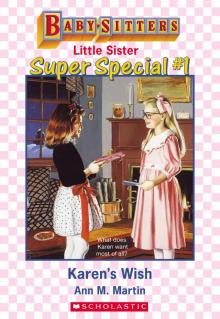 Karen's Wish
Karen's Wish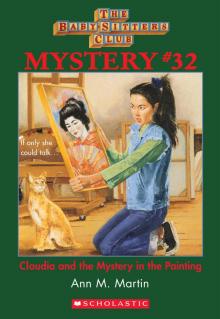 Claudia and the Mystery in the Painting
Claudia and the Mystery in the Painting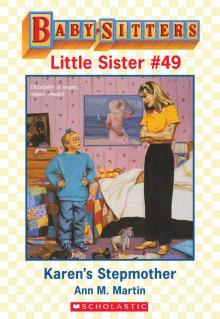 Karen's Stepmother
Karen's Stepmother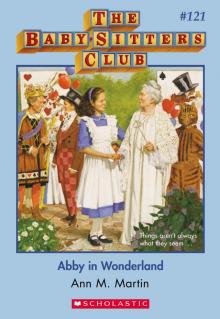 Abby in Wonderland
Abby in Wonderland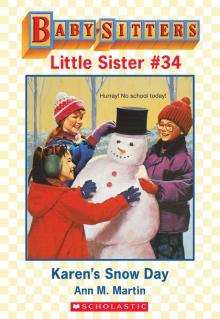 Karen's Snow Day
Karen's Snow Day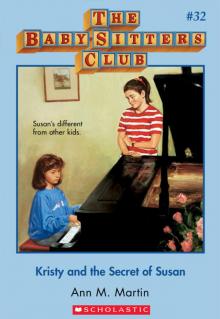 Kristy and the Secret of Susan
Kristy and the Secret of Susan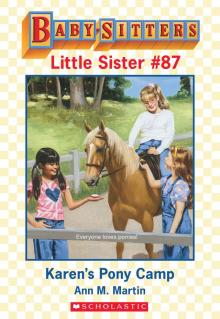 Karen's Pony Camp
Karen's Pony Camp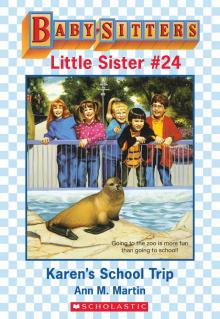 Karen's School Trip
Karen's School Trip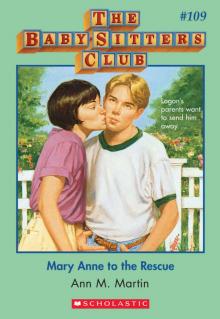 Mary Anne to the Rescue
Mary Anne to the Rescue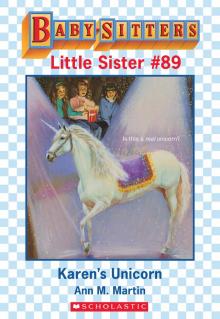 Karen's Unicorn
Karen's Unicorn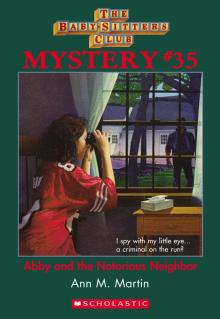 Abby and the Notorious Neighbor
Abby and the Notorious Neighbor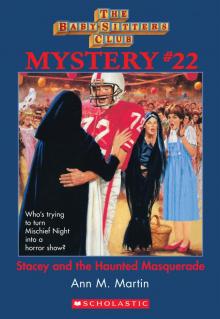 Stacey and the Haunted Masquerade
Stacey and the Haunted Masquerade Claudia Gets Her Guy
Claudia Gets Her Guy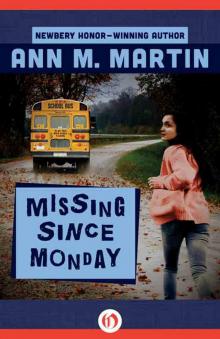 Missing Since Monday
Missing Since Monday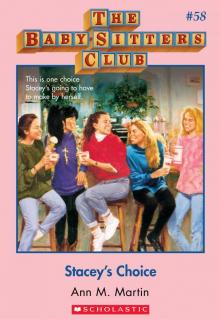 Stacey's Choice
Stacey's Choice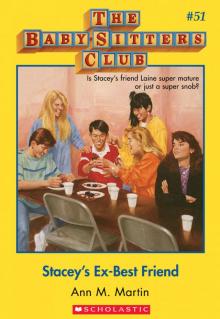 Stacey's Ex-Best Friend
Stacey's Ex-Best Friend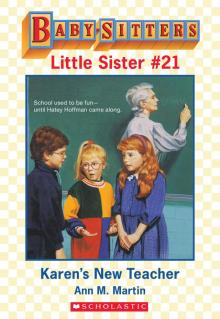 Karen's New Teacher
Karen's New Teacher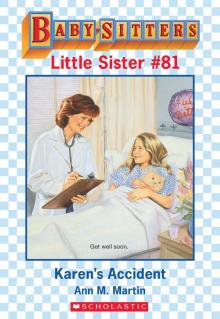 Karen's Accident
Karen's Accident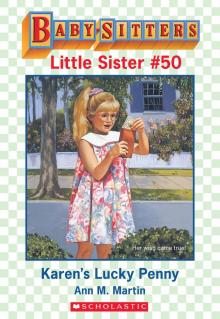 Karen's Lucky Penny
Karen's Lucky Penny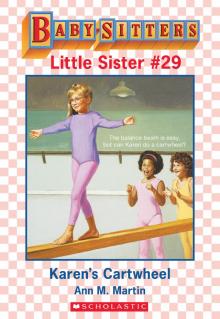 Karen's Cartwheel
Karen's Cartwheel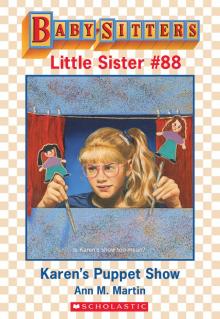 Karen's Puppet Show
Karen's Puppet Show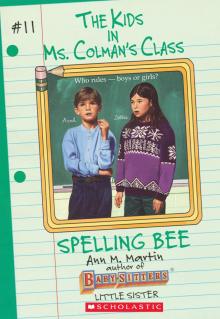 Spelling Bee
Spelling Bee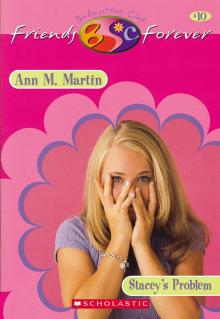 Stacey's Problem
Stacey's Problem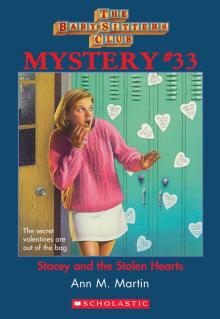 Stacey and the Stolen Hearts
Stacey and the Stolen Hearts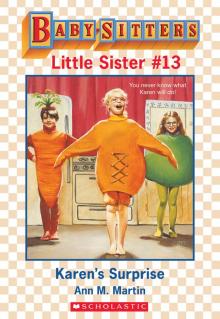 Karen's Surprise
Karen's Surprise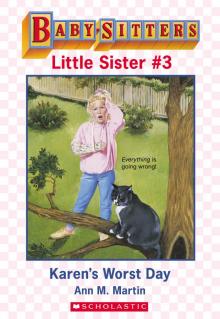 Karen's Worst Day
Karen's Worst Day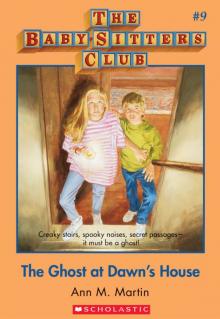 The Ghost at Dawn's House
The Ghost at Dawn's House Karen's Big Sister
Karen's Big Sister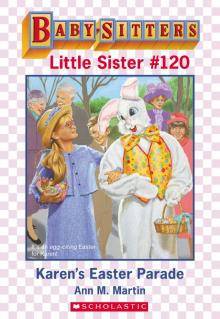 Karen's Easter Parade
Karen's Easter Parade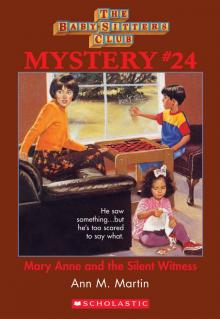 Mary Anne and the Silent Witness
Mary Anne and the Silent Witness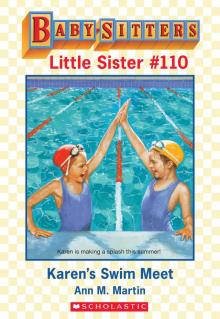 Karen's Swim Meet
Karen's Swim Meet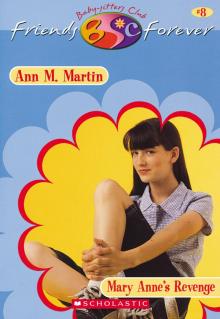 Mary Anne's Revenge
Mary Anne's Revenge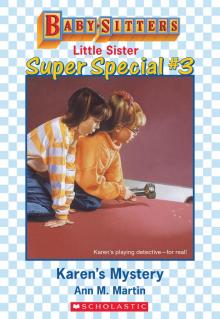 Karen's Mystery
Karen's Mystery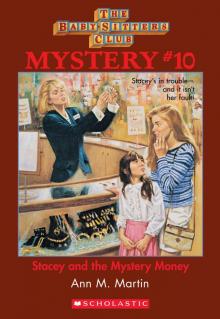 Stacey and the Mystery Money
Stacey and the Mystery Money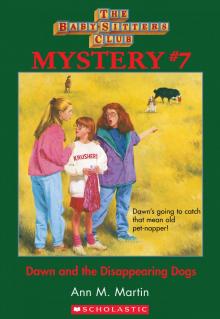 Dawn and the Disappearing Dogs
Dawn and the Disappearing Dogs Karen's Christmas Tree
Karen's Christmas Tree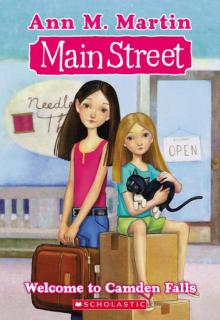 Welcome to Camden Falls
Welcome to Camden Falls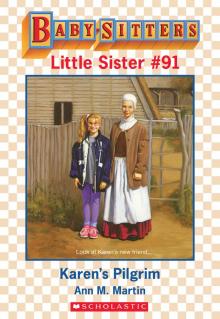 Karen's Pilgrim
Karen's Pilgrim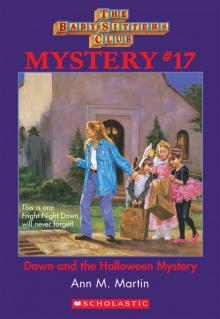 Dawn and the Halloween Mystery
Dawn and the Halloween Mystery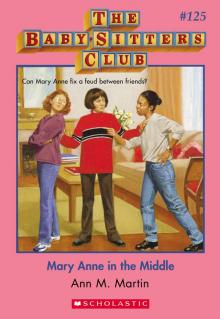 Mary Anne in the Middle
Mary Anne in the Middle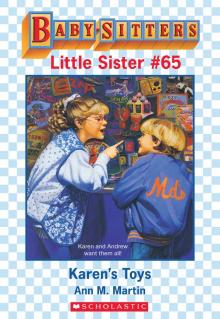 Karen's Toys
Karen's Toys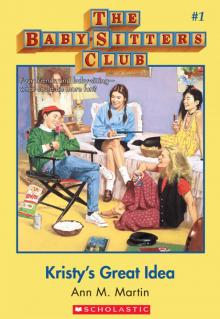 Kristy's Great Idea
Kristy's Great Idea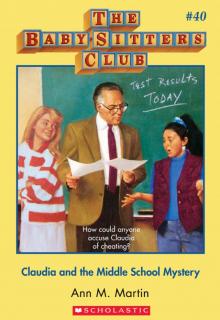 Claudia and the Middle School Mystery
Claudia and the Middle School Mystery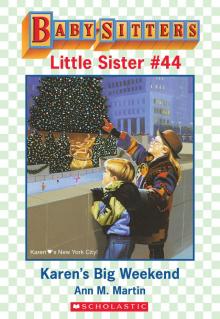 Karen's Big Weekend
Karen's Big Weekend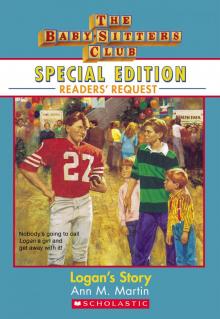 Logan's Story
Logan's Story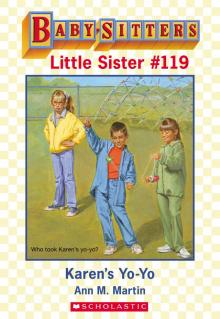 Karen's Yo-Yo
Karen's Yo-Yo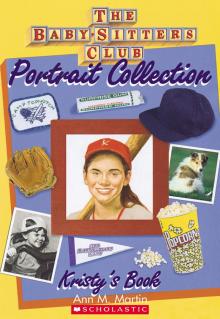 Kristy's Book
Kristy's Book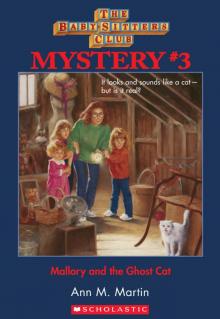 Mallory and the Ghost Cat
Mallory and the Ghost Cat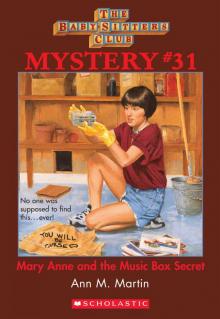 Mary Anne and the Music
Mary Anne and the Music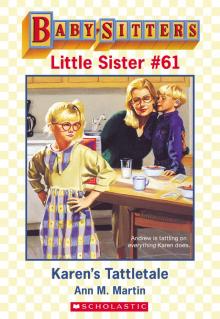 Karen's Tattletale
Karen's Tattletale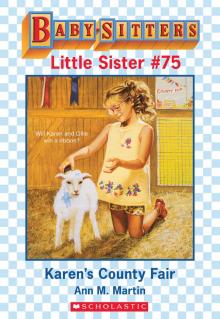 Karen's County Fair
Karen's County Fair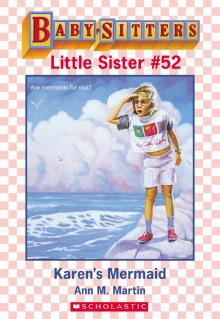 Karen's Mermaid
Karen's Mermaid Snowbound
Snowbound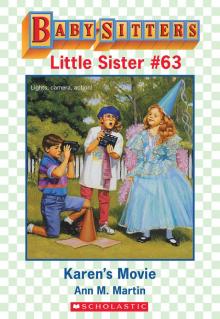 Karen's Movie
Karen's Movie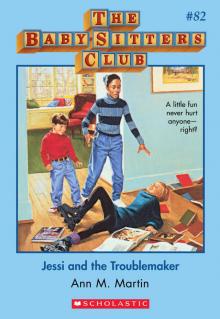 Jessi and the Troublemaker
Jessi and the Troublemaker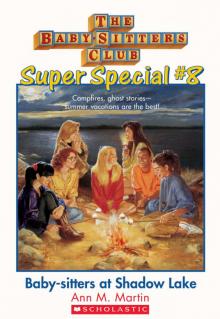 Baby-Sitters at Shadow Lake
Baby-Sitters at Shadow Lake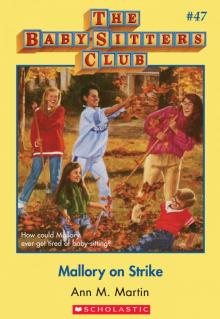 Mallory on Strike
Mallory on Strike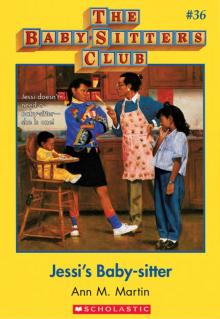 Jessi's Baby-Sitter
Jessi's Baby-Sitter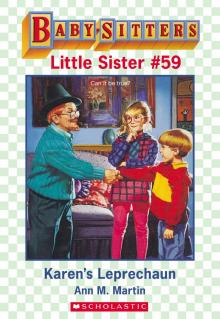 Karen's Leprechaun
Karen's Leprechaun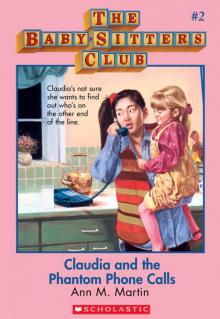 Claudia and the Phantom Phone Calls
Claudia and the Phantom Phone Calls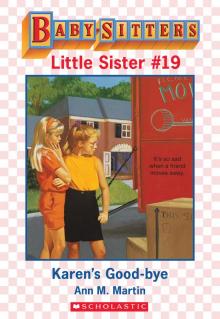 Karen's Good-Bye
Karen's Good-Bye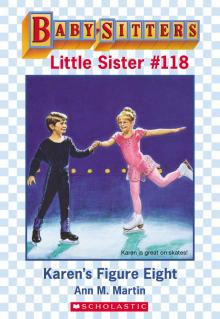 Karen's Figure Eight
Karen's Figure Eight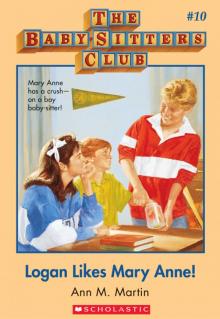 Logan Likes Mary Anne!
Logan Likes Mary Anne!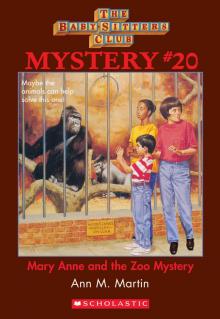 Mary Anne and the Zoo Mystery
Mary Anne and the Zoo Mystery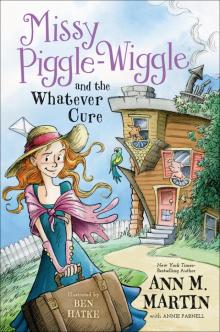 Missy Piggle-Wiggle and the Whatever Cure
Missy Piggle-Wiggle and the Whatever Cure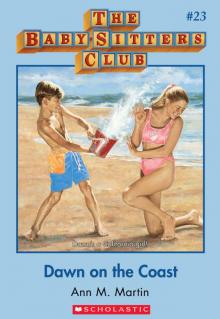 Dawn on the Coast
Dawn on the Coast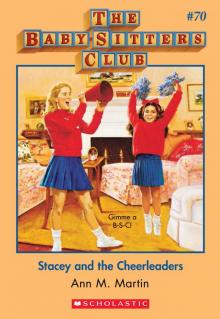 Stacey and the Cheerleaders
Stacey and the Cheerleaders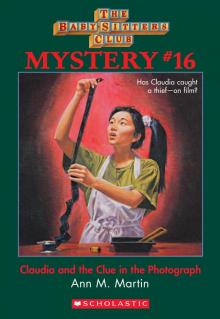 Claudia and the Clue in the Photograph
Claudia and the Clue in the Photograph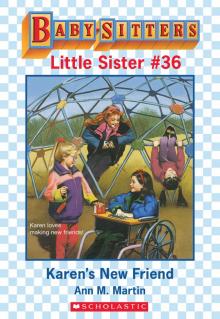 Karen's New Friend
Karen's New Friend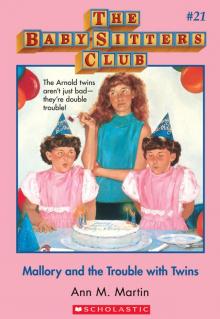 Mallory and the Trouble With Twins
Mallory and the Trouble With Twins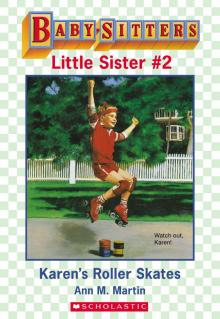 Karen's Roller Skates
Karen's Roller Skates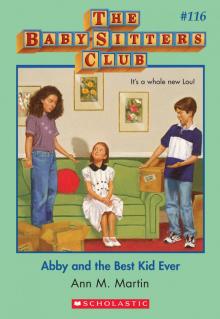 Abby and the Best Kid Ever
Abby and the Best Kid Ever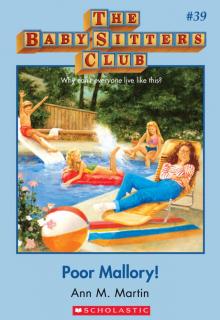 Poor Mallory!
Poor Mallory!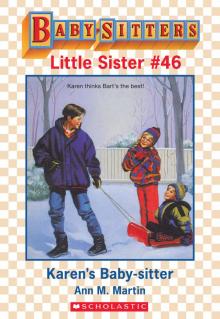 Karen's Witch
Karen's Witch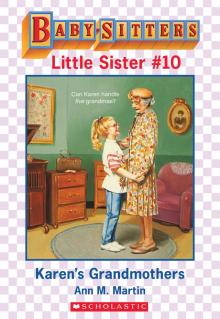 Karen's Grandmothers
Karen's Grandmothers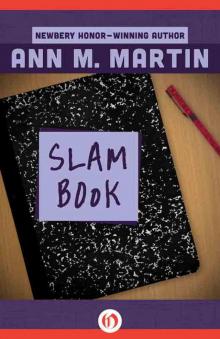 Slam Book
Slam Book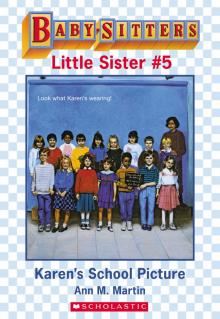 Karen's School Picture
Karen's School Picture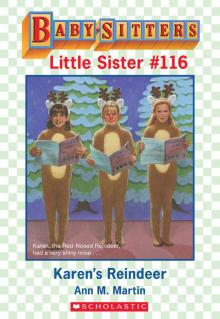 Karen's Reindeer
Karen's Reindeer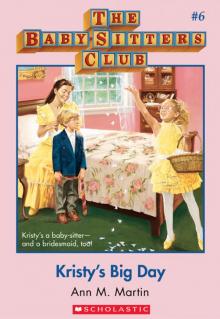 Kristy's Big Day
Kristy's Big Day The Long Way Home
The Long Way Home Karen's Sleigh Ride
Karen's Sleigh Ride On Christmas Eve
On Christmas Eve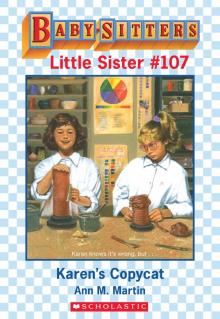 Karen's Copycat
Karen's Copycat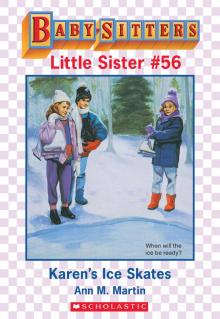 Karen's Ice Skates
Karen's Ice Skates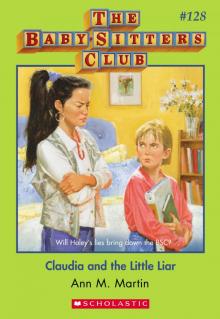 Claudia and the Little Liar
Claudia and the Little Liar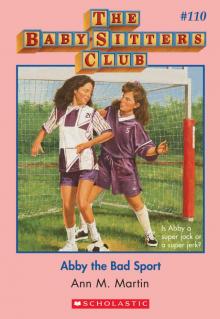 Abby the Bad Sport
Abby the Bad Sport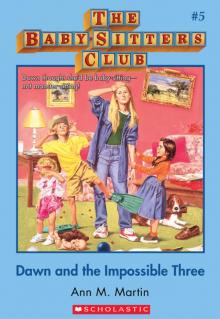 The Baby-Sitters Club #5: Dawn and the Impossible Three
The Baby-Sitters Club #5: Dawn and the Impossible Three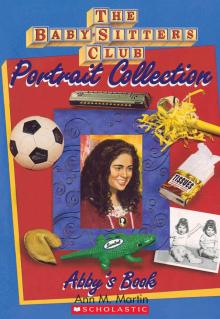 Abby's Book
Abby's Book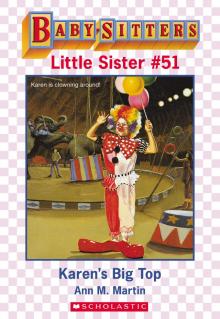 Karen's Big Top
Karen's Big Top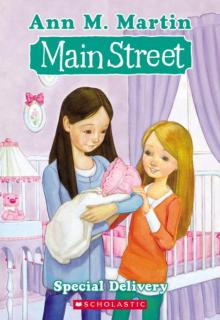 Main Street #8: Special Delivery
Main Street #8: Special Delivery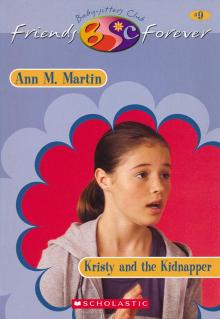 Kristy and the Kidnapper
Kristy and the Kidnapper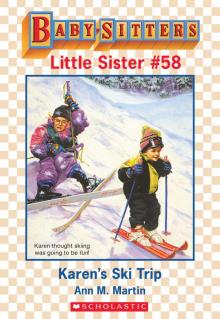 Karen's Ski Trip
Karen's Ski Trip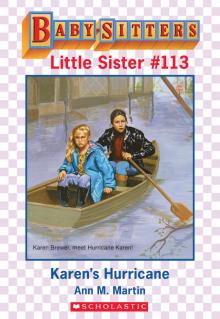 Karen's Hurricane
Karen's Hurricane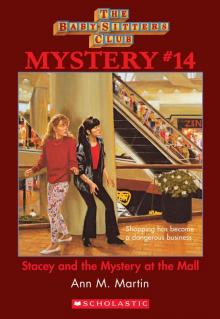 Stacey and the Mystery at the Mall
Stacey and the Mystery at the Mall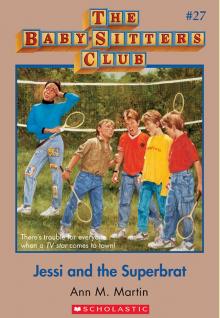 Jessi and the Superbrat
Jessi and the Superbrat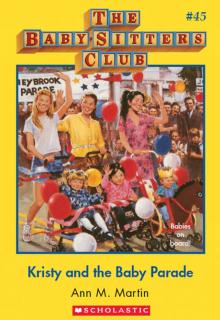 Kristy and the Baby Parade
Kristy and the Baby Parade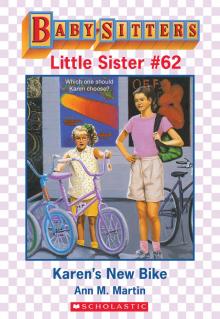 Karen's New Bike
Karen's New Bike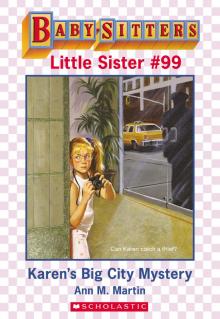 Karen's Big City Mystery
Karen's Big City Mystery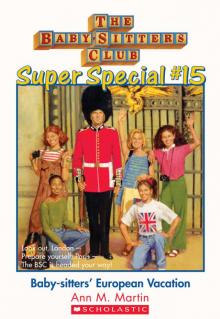 Baby-Sitters' European Vacation
Baby-Sitters' European Vacation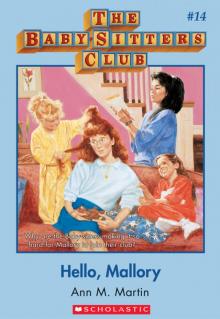 Hello, Mallory
Hello, Mallory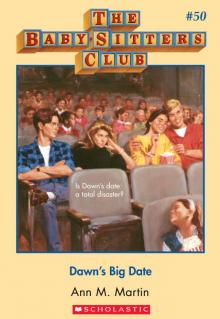 Dawn's Big Date
Dawn's Big Date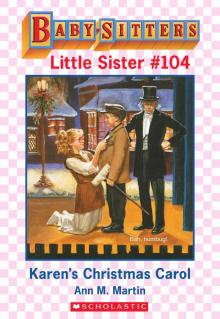 Karen's Christmas Carol
Karen's Christmas Carol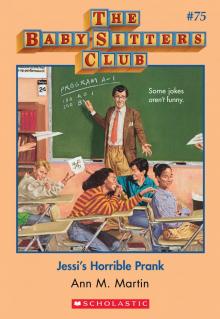 Jessi's Horrible Prank
Jessi's Horrible Prank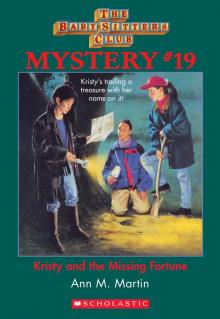 Kristy and the Missing Fortune
Kristy and the Missing Fortune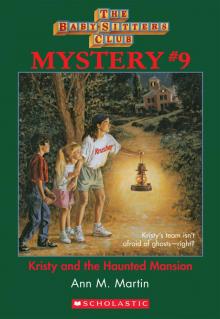 Kristy and the Haunted Mansion
Kristy and the Haunted Mansion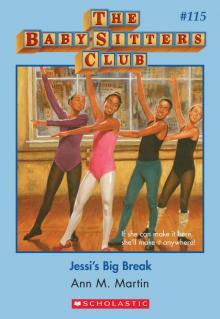 Jessi's Big Break
Jessi's Big Break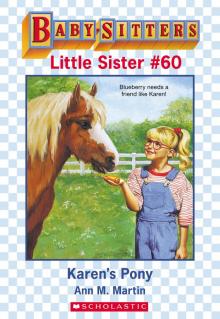 Karen's Pony
Karen's Pony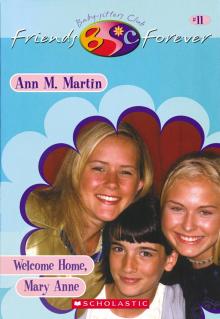 Welcome Home, Mary Anne
Welcome Home, Mary Anne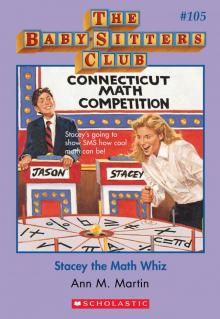 Stacey the Math Whiz
Stacey the Math Whiz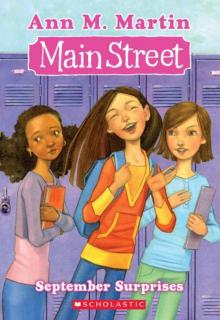 September Surprises
September Surprises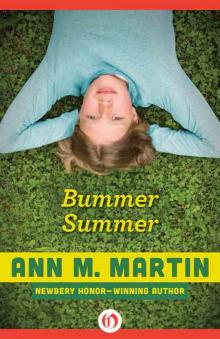 Bummer Summer
Bummer Summer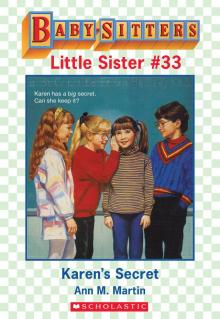 Karen's Secret
Karen's Secret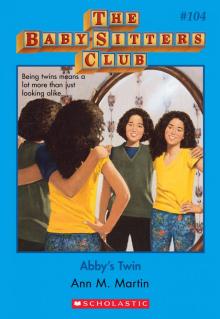 Abby's Twin
Abby's Twin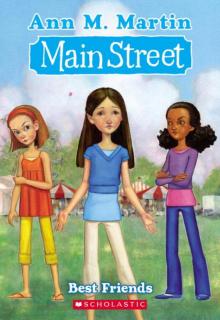 Main Street #4: Best Friends
Main Street #4: Best Friends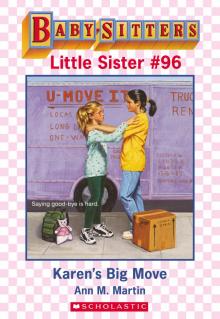 Karen's Big Move
Karen's Big Move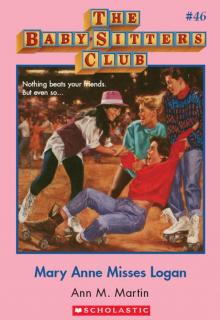 Mary Anne Misses Logan
Mary Anne Misses Logan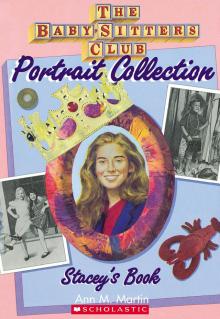 Stacey's Book
Stacey's Book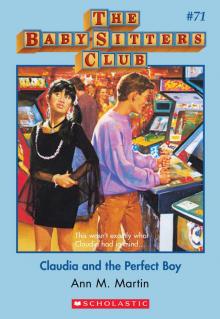 Claudia and the Perfect Boy
Claudia and the Perfect Boy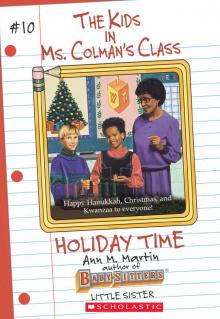 Holiday Time
Holiday Time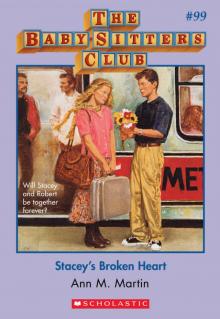 Stacey's Broken Heart
Stacey's Broken Heart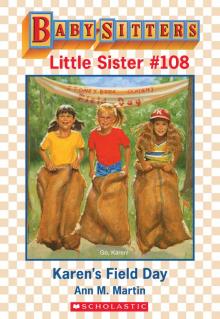 Karen's Field Day
Karen's Field Day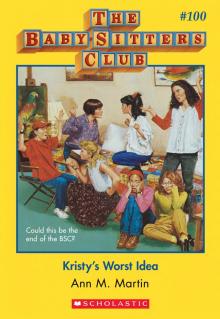 Kristy's Worst Idea
Kristy's Worst Idea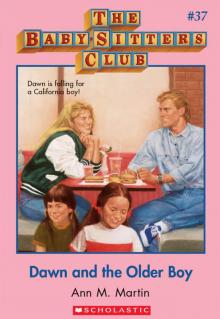 Dawn and the Older Boy
Dawn and the Older Boy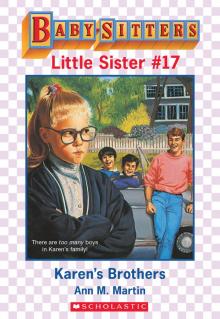 Karen's Brothers
Karen's Brothers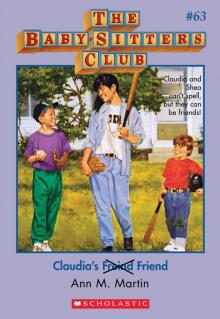 Claudia's Friend
Claudia's Friend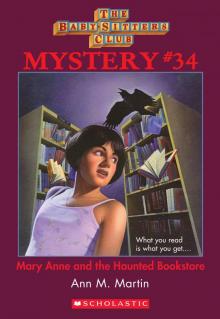 Mary Anne and the Haunted Bookstore
Mary Anne and the Haunted Bookstore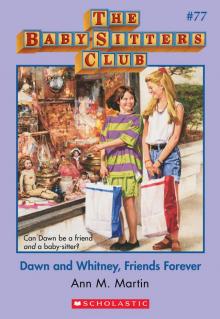 Dawn and Whitney, Friends Forever
Dawn and Whitney, Friends Forever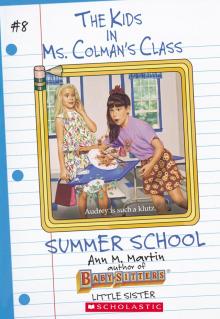 Summer School
Summer School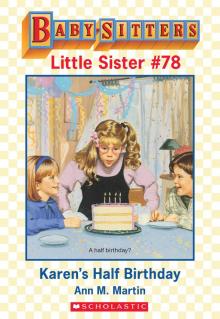 Karen's Birthday
Karen's Birthday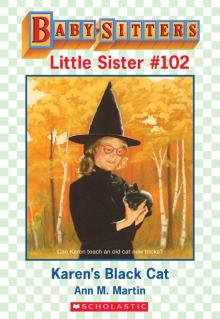 Karen's Black Cat
Karen's Black Cat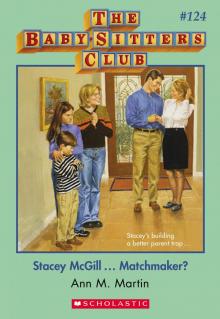 Stacey McGill... Matchmaker?
Stacey McGill... Matchmaker?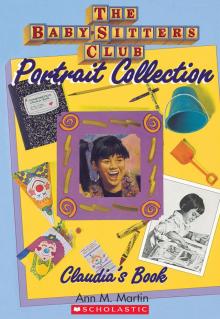 Claudia's Book
Claudia's Book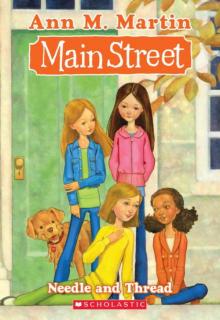 Main Street #2: Needle and Thread
Main Street #2: Needle and Thread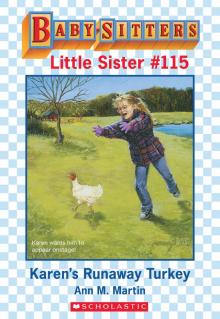 Karen's Runaway Turkey
Karen's Runaway Turkey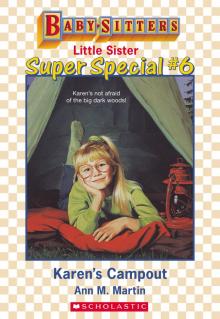 Karen's Campout
Karen's Campout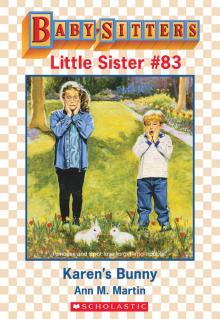 Karen's Bunny
Karen's Bunny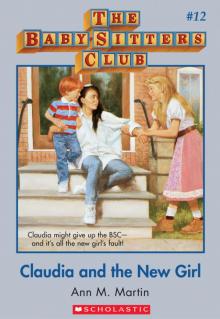 Claudia and the New Girl
Claudia and the New Girl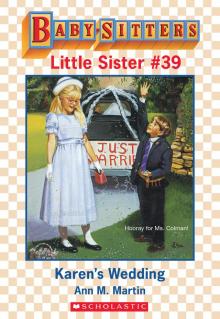 Karen's Wedding
Karen's Wedding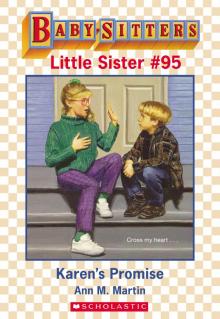 Karen's Promise
Karen's Promise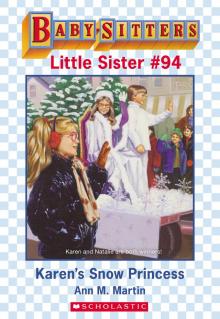 Karen's Snow Princess
Karen's Snow Princess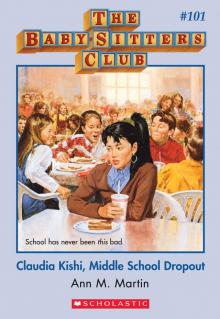 Claudia Kishi, Middle School Dropout
Claudia Kishi, Middle School Dropout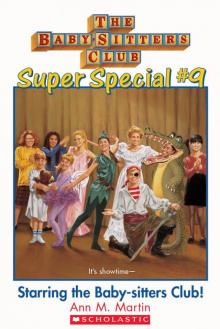 Starring the Baby-Sitters Club!
Starring the Baby-Sitters Club!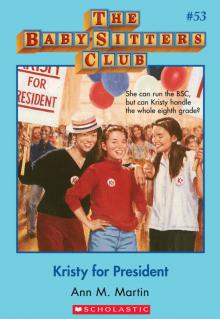 Kristy for President
Kristy for President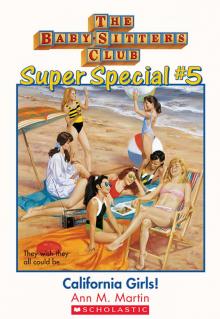 California Girls!
California Girls!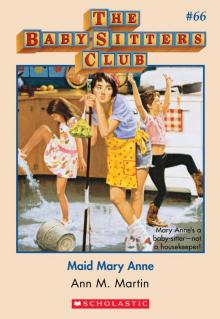 Maid Mary Anne
Maid Mary Anne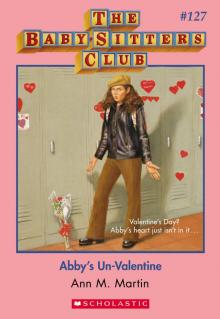 Abby's Un-Valentine
Abby's Un-Valentine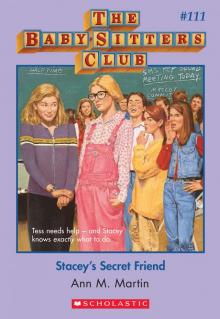 Stacey's Secret Friend
Stacey's Secret Friend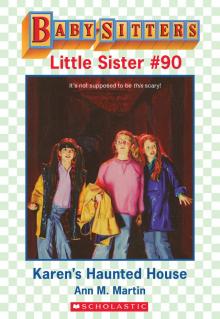 Karen's Haunted House
Karen's Haunted House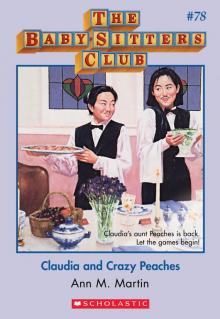 Claudia and Crazy Peaches
Claudia and Crazy Peaches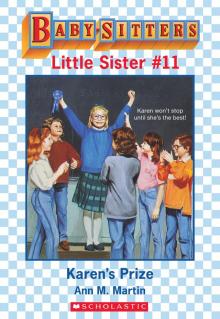 Karen's Prize
Karen's Prize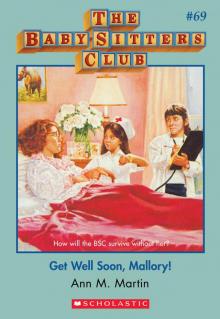 Get Well Soon, Mallory!
Get Well Soon, Mallory!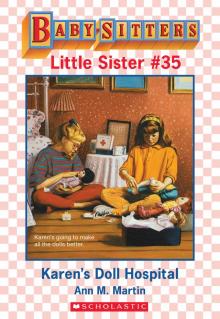 Karen's Doll Hospital
Karen's Doll Hospital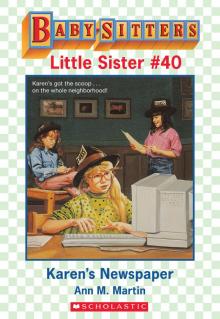 Karen's Newspaper
Karen's Newspaper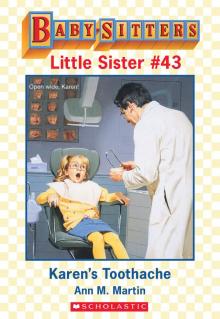 Karen's Toothache
Karen's Toothache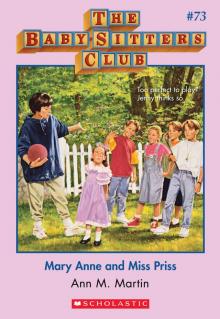 Mary Anne and Miss Priss
Mary Anne and Miss Priss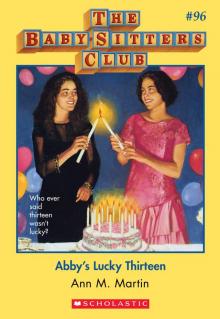 Abby's Lucky Thirteen
Abby's Lucky Thirteen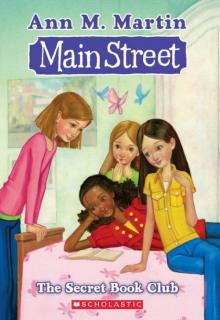 The Secret Book Club
The Secret Book Club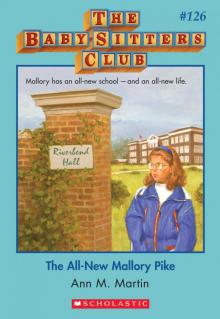 The All-New Mallory Pike
The All-New Mallory Pike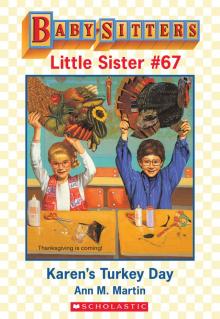 Karen's Turkey Day
Karen's Turkey Day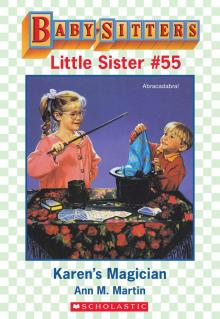 Karen's Magician
Karen's Magician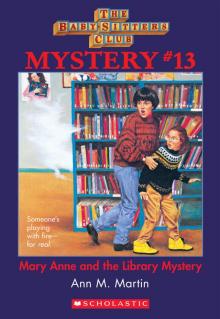 Mary Anne and the Library Mystery
Mary Anne and the Library Mystery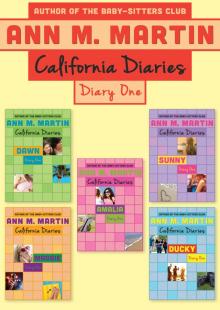 Diary One: Dawn, Sunny, Maggie, Amalia, and Ducky
Diary One: Dawn, Sunny, Maggie, Amalia, and Ducky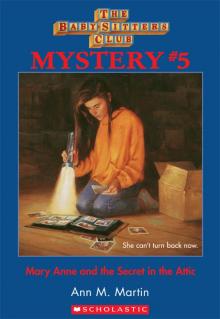 Mary Anne and the Secret in the Attic
Mary Anne and the Secret in the Attic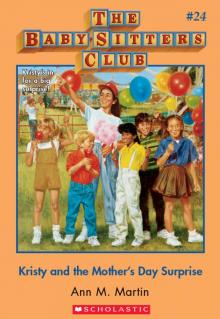 Kristy and the Mother's Day Surprise
Kristy and the Mother's Day Surprise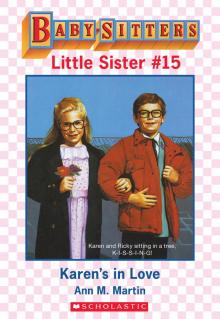 Karen's in Love
Karen's in Love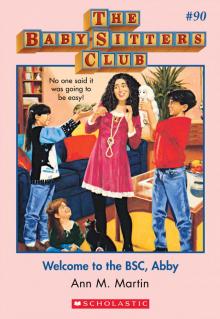 Welcome to the BSC, Abby
Welcome to the BSC, Abby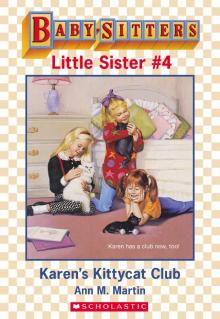 Karen's Kittycat Club
Karen's Kittycat Club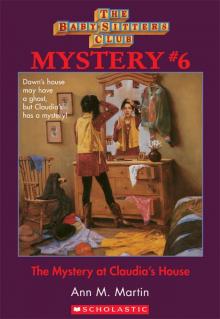 The Mystery at Claudia's House
The Mystery at Claudia's House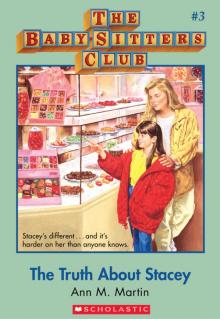 The Truth About Stacey
The Truth About Stacey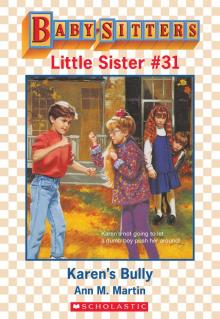 Karen's Bully
Karen's Bully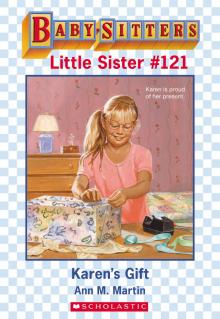 Karen's Gift
Karen's Gift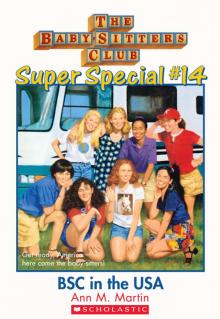 BSC in the USA
BSC in the USA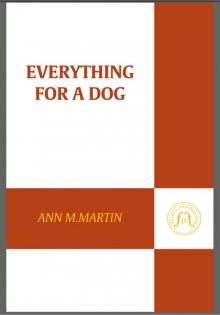 Everything for a Dog
Everything for a Dog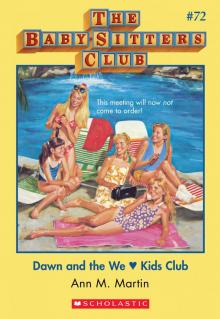 Dawn and the We Love Kids Club
Dawn and the We Love Kids Club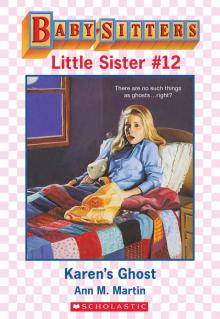 Karen's Ghost
Karen's Ghost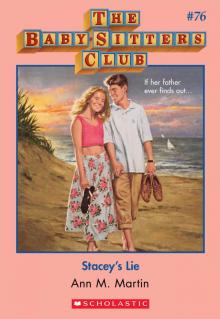 Stacey's Lie
Stacey's Lie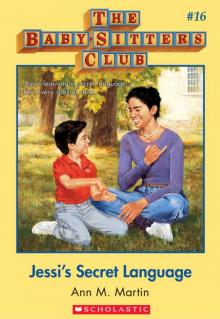 Jessi's Secret Language
Jessi's Secret Language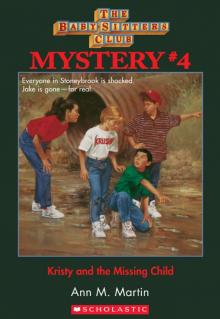 Kristy and the Missing Child
Kristy and the Missing Child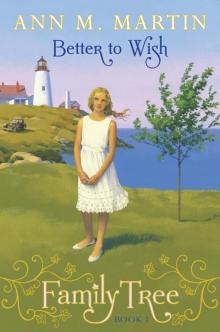 Better to Wish
Better to Wish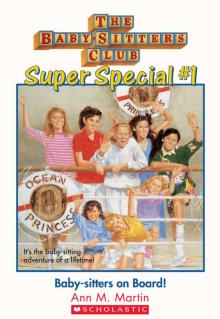 Baby-Sitters on Board!
Baby-Sitters on Board!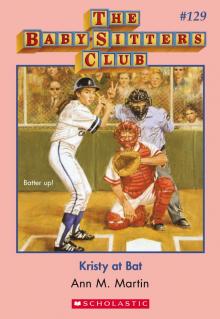 Kristy at Bat
Kristy at Bat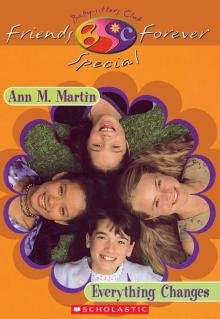 Everything Changes
Everything Changes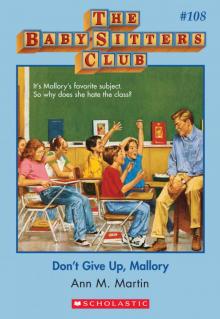 Don't Give Up, Mallory
Don't Give Up, Mallory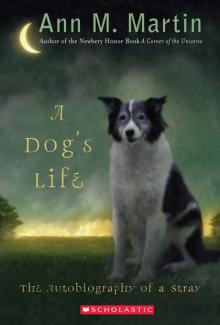 A Dog's Life: The Autobiography of a Stray
A Dog's Life: The Autobiography of a Stray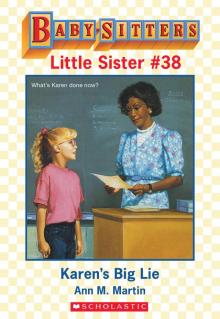 Karen's Big Lie
Karen's Big Lie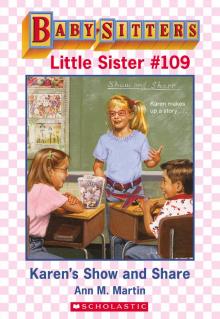 Karen's Show and Share
Karen's Show and Share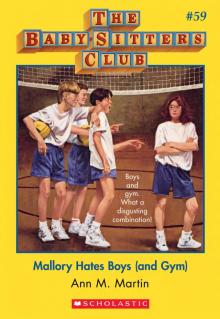 Mallory Hates Boys (and Gym)
Mallory Hates Boys (and Gym)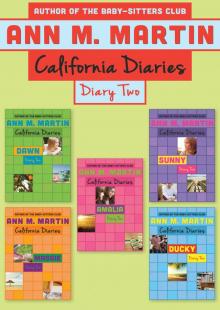 Diary Two: Dawn, Sunny, Maggie, Amalia, and Ducky
Diary Two: Dawn, Sunny, Maggie, Amalia, and Ducky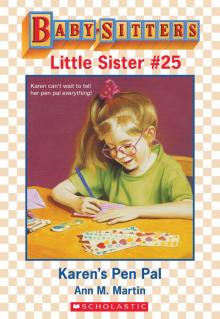 Karen's Pen Pal
Karen's Pen Pal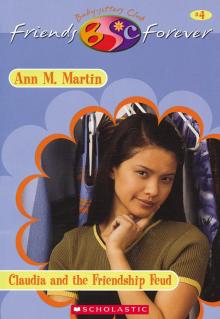 Claudia and the Friendship Feud
Claudia and the Friendship Feud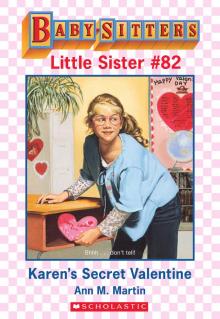 Karen's Secret Valentine
Karen's Secret Valentine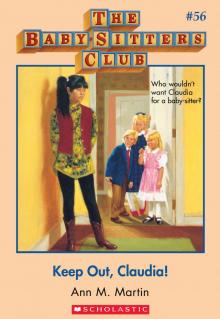 Keep Out, Claudia!
Keep Out, Claudia!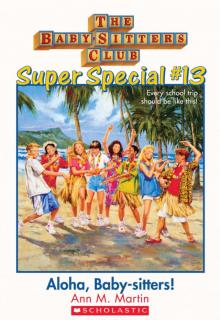 Aloha, Baby-Sitters!
Aloha, Baby-Sitters!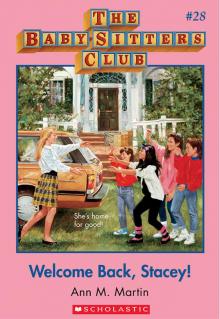 Welcome Back, Stacey
Welcome Back, Stacey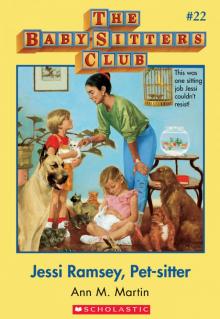 Jessi Ramsey, Pet-Sitter
Jessi Ramsey, Pet-Sitter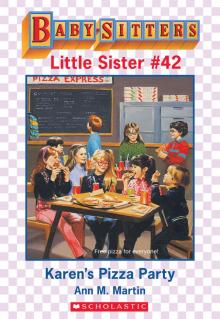 Karen's Pizza Party
Karen's Pizza Party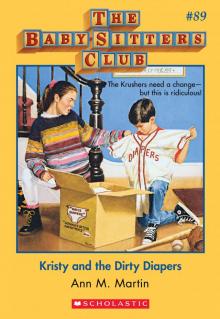 Kristy and the Dirty Diapers
Kristy and the Dirty Diapers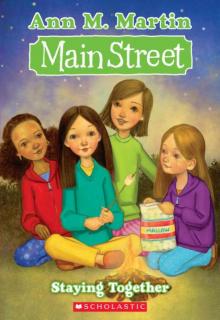 Staying Together
Staying Together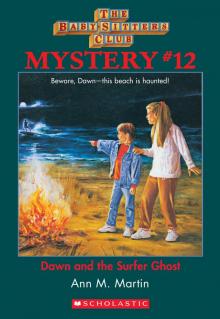 Dawn and the Surfer Ghost
Dawn and the Surfer Ghost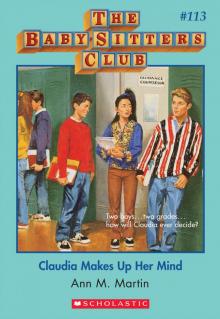 Claudia Makes Up Her Mind
Claudia Makes Up Her Mind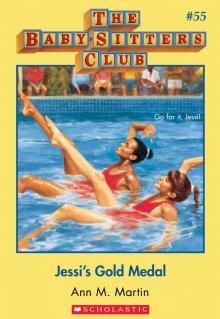 Jessi's Gold Medal
Jessi's Gold Medal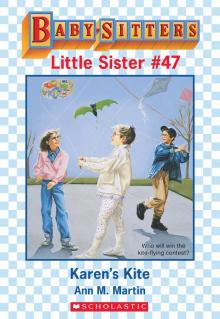 Karen's Kite
Karen's Kite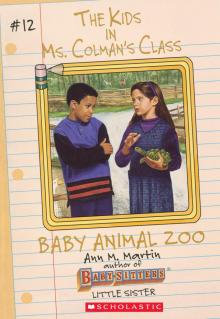 Baby Animal Zoo
Baby Animal Zoo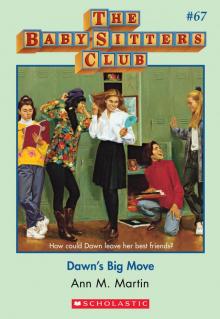 Dawn's Big Move
Dawn's Big Move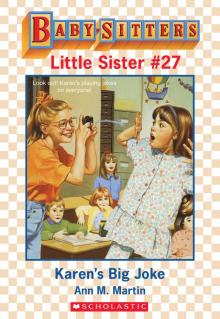 Karen's Big Joke
Karen's Big Joke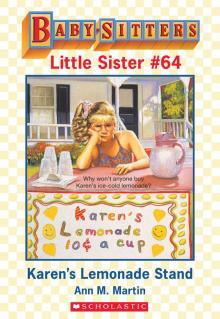 Karen's Lemonade Stand
Karen's Lemonade Stand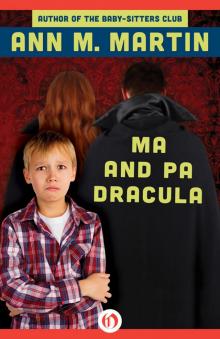 Ma and Pa Dracula
Ma and Pa Dracula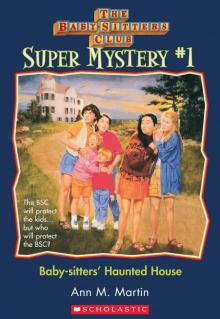 Baby-Sitters' Haunted House
Baby-Sitters' Haunted House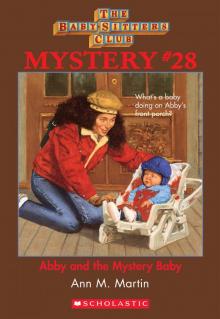 Abby and the Mystery Baby
Abby and the Mystery Baby Home Is the Place
Home Is the Place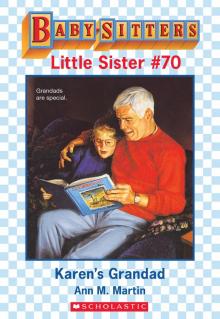 Karen's Grandad
Karen's Grandad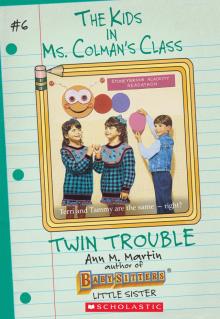 Twin Trouble
Twin Trouble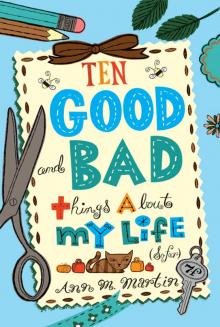 Ten Good and Bad Things About My Life (So Far)
Ten Good and Bad Things About My Life (So Far)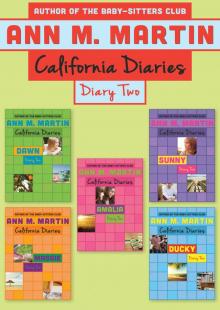 Diary Two
Diary Two Baby-Sitters Club 027
Baby-Sitters Club 027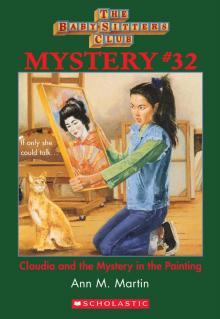 Claudia and the Mystery Painting
Claudia and the Mystery Painting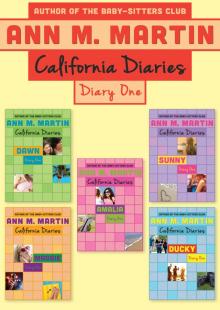 Diary One
Diary One Baby-Sitters Club 037
Baby-Sitters Club 037 Baby-Sitters Club 028
Baby-Sitters Club 028 Baby-Sitters Club 085
Baby-Sitters Club 085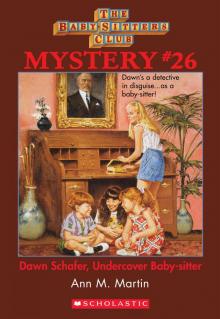 Dawn Schaffer Undercover Baby-Sitter
Dawn Schaffer Undercover Baby-Sitter Jessi's Babysitter
Jessi's Babysitter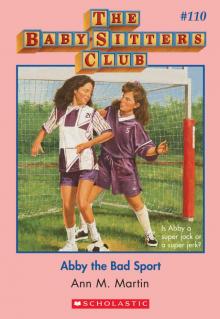 The Baby-Sitters Club #110: Abby the Bad Sport (Baby-Sitters Club, The)
The Baby-Sitters Club #110: Abby the Bad Sport (Baby-Sitters Club, The) Karen's Little Sister
Karen's Little Sister Baby-Sitters Club 058
Baby-Sitters Club 058 Claudia And The Genius On Elm St.
Claudia And The Genius On Elm St.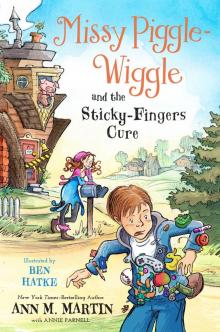 Missy Piggle-Wiggle and the Sticky-Fingers Cure
Missy Piggle-Wiggle and the Sticky-Fingers Cure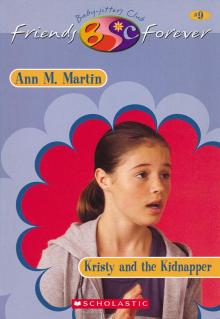 Kristy and Kidnapper
Kristy and Kidnapper Baby-Sitters Club 041
Baby-Sitters Club 041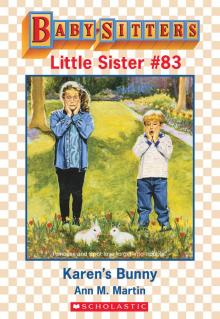 Karen's Bunny Trouble
Karen's Bunny Trouble Baby-Sitters Club 032
Baby-Sitters Club 032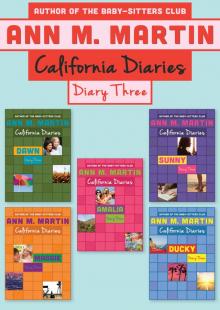 Diary Three
Diary Three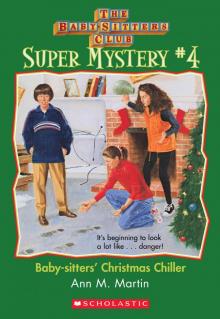 Christmas Chiller
Christmas Chiller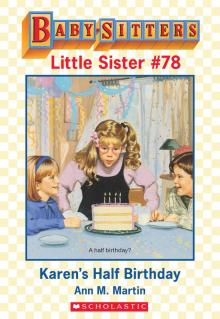 Karen's Half-Birthday
Karen's Half-Birthday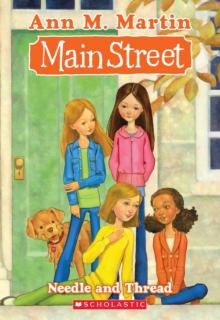 Needle and Thread
Needle and Thread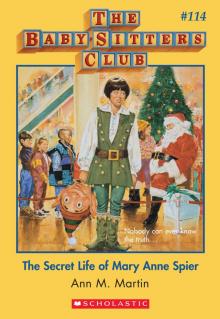 Secret Life of Mary Anne Spier
Secret Life of Mary Anne Spier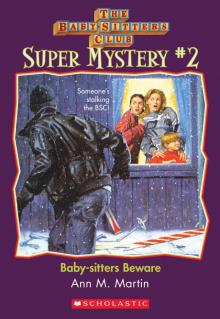 Baby-Sitters Beware
Baby-Sitters Beware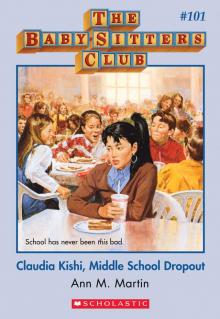 Claudia Kishi, Middle School Drop-Out
Claudia Kishi, Middle School Drop-Out Logan Likes Mary Anne !
Logan Likes Mary Anne ! Baby-Sitters Club 061
Baby-Sitters Club 061 Best Friends
Best Friends Baby-Sitters Club 031
Baby-Sitters Club 031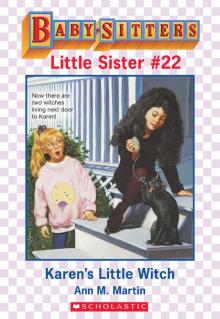 Karen's Little Witch
Karen's Little Witch Jessi Ramsey, Petsitter
Jessi Ramsey, Petsitter Baby-Sitters Club 123
Baby-Sitters Club 123 Baby-Sitters Club 059
Baby-Sitters Club 059 Baby-Sitters Club 033
Baby-Sitters Club 033 Baby-Sitters Club 060
Baby-Sitters Club 060 Baby-Sitters Club 094
Baby-Sitters Club 094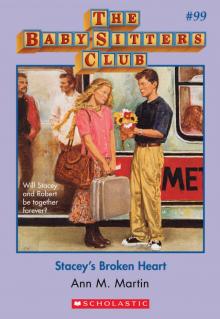 The Baby-Sitters Club #99: Stacey's Broken Heart
The Baby-Sitters Club #99: Stacey's Broken Heart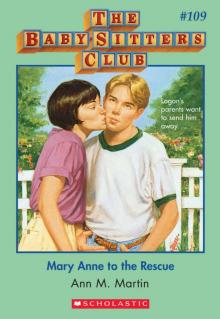 The Baby-Sitters Club #109: Mary Anne to the Rescue (Baby-Sitters Club, The)
The Baby-Sitters Club #109: Mary Anne to the Rescue (Baby-Sitters Club, The) Mystery At Claudia's House
Mystery At Claudia's House Claudia And The Sad Goodbye
Claudia And The Sad Goodbye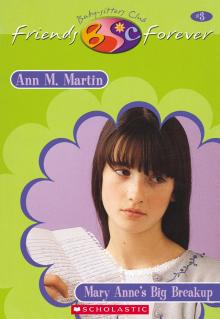 Mary Anne's Big Break-Up
Mary Anne's Big Break-Up Baby-Sitters Club 025
Baby-Sitters Club 025 Baby-Sitters Club 042
Baby-Sitters Club 042 Stacey and the Mystery of the Empty House
Stacey and the Mystery of the Empty House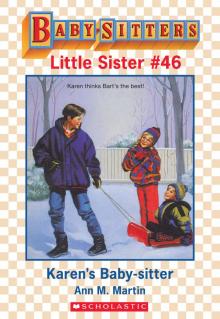 Karen's Baby-Sitter
Karen's Baby-Sitter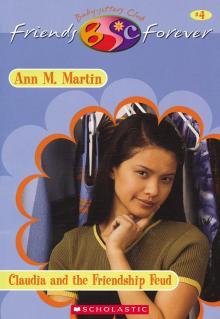 Claudia's Friendship Feud
Claudia's Friendship Feud Baby-Sitters Club 090
Baby-Sitters Club 090 Baby-Sitters Club 021
Baby-Sitters Club 021 Baby-Sitters Club 056
Baby-Sitters Club 056 Baby-Sitters Club 040
Baby-Sitters Club 040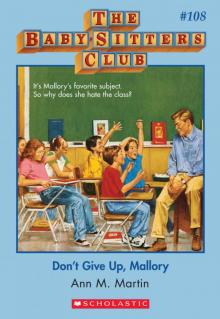 The Baby-Sitters Club #108: Don't Give Up, Mallory (Baby-Sitters Club, The)
The Baby-Sitters Club #108: Don't Give Up, Mallory (Baby-Sitters Club, The)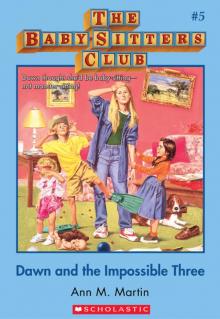 Dawn and the Impossible Three
Dawn and the Impossible Three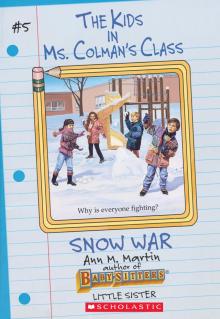 The Snow War
The Snow War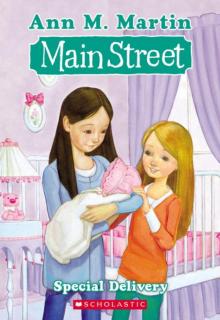 Special Delivery
Special Delivery Baby-Sitters Club 057
Baby-Sitters Club 057 Mary Anne And Too Many Babies
Mary Anne And Too Many Babies Baby-Sitters Club 030
Baby-Sitters Club 030